#but happy death day to bonaparte!!!!
Explore tagged Tumblr posts
Text

"Bella gerunt alii, tu felix Austria nube!"
Day 6 of @spaus-week 's challenge
"Let others wage war, you, happy Austria, marry!" Was the political strategy of the Habsburgs, and marry did the House of Austria! Infamously, scandalously, sensationally. A mangled wreath of a family tree. We all know this horror story. And we all know the bitter end.
After Emperor Charles V&I divided his Spanish and Austrian inheritance ((also gained through his parents' and grandparents' marriages)) to his descendants and those of his younger brother Ferdinand I respectively, the Habsburg dynasty split into two branches. The Spanish and Austrian Habsburgs notoriously intermarried for generations, right up till Charles II of Spain whose heirless death in 1700 sparked the War of the Spanish Succession. The inbreeding and this informal Latin motto behind it has been blamed to hell and back for their implosion, for the physical ugliness that ran in this royal bloodline. But it is not to say the Habsburgs never went to war, nor that dynastic marriage was a political strategy unique to them! But they were, if anything, bloody successful at it seeing how they did rule half of Europe for 200 years, and then a lot of it in the Austrian line for another 200. Before anyone figured out inbreeding was bad it was considered a privilege to marry into the Habsburgs, with Louis XV claiming that Louis XVI's betrothal to Marie Antoinette was marrying the "Daughter of the Caesars", and Napoleon Bonaparte infamously ditching Josephine for Marie Louise. Charles II was a poor sod who took the fall and the mugs were wretched from the same ugly gene being passed around countless times*, but they did wear power and privilege well.
💅✨ Symbolism bc I'm a NERD and this my Category 10 autism event ✨💅 :
Charles V & Ferdinand I's joint portrait based on that propaganda woodcut, behind them the colours of the Habsburg flag.
The Spanish branch, comprising Charles V & I's descendants, is represented with a black background, and the Austrian branch, comprising Ferdinand I's descendants, gold, both colours pulled from their flag, a dynasty intertwined but split in two.
Round frames denote that the individual had no heirs.
Only the most influential ruler on both sides, the King of Spain and the Holy Roman Emperor, are represented as framed portraits, explaining Archduke Charles II's unframed depiction.
The unconventional placement of Charles II of Spain and Emperor Rudolf II's nameplates are a nod to their queerness: their intersexuality and bisexuality respectively.
Ferdinand III's portrait is lopsided because of the losses of the 30 Years War.
Cracks in Charles II's portrait: 🙃🙃🙃
#Was this just an excuse for me to draw the family tree/wreath? YES. Might continue it to Blessed Karl™ *faints*.#That said i literally took three tries to get the Austrian branch right in just this fraction. Nightmare.#spausweek#Charles v#philip ii#philip ii of spain#Philip iii#philip iv of spain#felipe iv#charles ii of spain#Carlos ii#ferdinand i#Maximilian ii#rudolf ii#Emperor Matthias#Ferdinand ii#Ferdinand iii#Leopold i#16th century#17th century#habsburg history#house of habsburg#austrian history#spanish history#historical hetalia#aph austria#aph spain#roderich edelstein#Antonio Fernandez#Hetalia
69 notes
·
View notes
Text

Robespierre mené au supplice by Pierre-Antoine Demachy , 1794.
For those saddened by the deaths of the Robespierre brothers, Philippe Le Bas, Couthon, Saint-Just, Hanriot ( I have to confess i'm so sad for Hanriot one of my top 10 of the frev), etc., remember that at least they died before witnessing the social aspects of the revolution being betrayed (or at least completely betrayed), unlike Goujon, Charles-Gilbert Romme, Gracchus Babeuf, etc. Or worse yet, seeing Napoleon put an end to the revolution (I think without a doubt that Augustin would have taken it very badly) with all the consequences that entails and a greater regression. You know, there is a quote that says happy are the revolutionaries who died before seeing all their ideals betrayed (remember the despair of Pierre- Germain Gateau, a friend of Saint-Just, who died in 1815 after seeing Louis XVIII return, surely the despair of the Jacobins under Napoleon who died in deportation signed by his order without any trial). When the executed of the 10th Thermidor died, they knew that France had been saved from foreign power and that it was necessary to remain vigilant to ensure that there was no military dictator or the return of the Bourbons. Revolutionaries like Prieur de la Marne saw both happen at the same time (imagine for him months, even years, of hard work with so many others, the efforts of a people ending up in such a situation). I’m not even talking about devoted revolutionaries like Louis Delgrès who learned that despite their devotion to the revolution and to France, they had no choice but to fight to regain their freedom ,dignity or die because of the reinstatement of slavery, or other black people who saw their rights taken away.
Another point that may comfort (or sadden) you is that despite their being outlawed, look at how many people came to their aid despite all the risks of helping them and ending up on the guillotine (which will happen, the number of guillotined will be frightening the day after the 10th Thermidor). This proves that loyalty cannot be bought and must be earned (I have already said this in one of my posts). Despite all their faults, it is clear that those condemned to death know how to inspire true loyalty. Moreover, they had scruples to the end concerning the legality of their actions. Compare this attitude to the deplorable attitude of the 18th Brumaire. After his lamentable behavior in Egypt to the point that Kleber had to clean up the fiasco of Bonaparte himself, Napoleon decided to take power for himself and conspired against the deputies of the Five Hundred with the complicity of some rather dubious characters. After being caught red-handed and deservedly outlawed (if you want my opinion), he immediately unleashed the army on the deputies who were expelled, and some were even arrested. Ultimately, when Bonaparte was really in trouble, not many people came to his aid. The difference in attitude between the Robespierre brothers, Philippe Le Bas, Couthon, Saint-Just (despite all their faults and things they have to reproach themselves for) and Bonaparte regarding the reason for being outlawed and how they reacted to it speaks volumes to me (even if some will say it is unfair that the first group mentioned went to the scaffold while Napoleon and Talleyrand, in particular, came to power).
These were just the reflections of an ordinary citizeness :)
#frev#french revolution#robespierre#thermidor#hanriot#saint-just#augustin robespierre#couthon#Le Bas#napoleon
34 notes
·
View notes
Text
'On Suicide' - an essay by 17-year-old Napoleon Bonaparte
(aka Napoleon's emo phase...)
"Solitary amidst men I return to my room to think alone and to abandon myself to my melancholy. Where does it lead me today? Towards death. In the springtime of life, I may hope to live long. I have been absent from my country six or seven years. What pleasure shall I have in four months seeing once more my companions and my parents? Can I not conclude, from the sweet sensations awakened by the remembrance of my childhood, that my happiness will be complete? What mad fellow urges me on to self-destruction? But what can be done in this world? Since I have to, is it not better to kill myself? If I was over sixty years of age I would respect the prejudices of my fellow creatures, and would wait patiently for nature to accomplish its work; but since I commence to experience unhappiness, and since nothing gives me pleasure, why should I endure days in which I succeed in nothing? How far men are from nature! How cowardly, vile and cringing they are! What is the spectacle I shall witness in my country? Fellow countrymen loaded with chains, all trembling, kissing the hand that oppresses them. They are no longer brave Corsicans animated by heroic virtues, and the enemies of tyrants, luxury and base courtesans. Proud and full of the noble consciousness of his own personal importance, a Corsican was formerly happy. If he had occupied his day in transacting public business, the night was spent in the tender arms of a dearly loved wife; his reason and his enthusiasm obliterated all the troubles of the day, tenderness and nature rendered the night comparable to that of the gods. But with liberty those happy days have vanished like a dream. Frenchmen! Not content with having despoiled us of all we loved, you have corrupted our manners. The present condition of my country, and my powerlessness to change it, are additional reasons for me to leave a land where I am obliged by duty to praise men whom I ought by virtue to hate. When I arrive in my country how am I to act, and what am I to do? When the mother country has ceased to exist, a good citizen should die. If I had to destroy but one man in order to deliver my fellow countrymen I would start at once. I would plunge the avenging dagger up to the hilt in the breast of the tyrant. My life is a burden, because I taste no pleasure, and because, for me, everything is wearisome. My life is a burden, because I live, and must probably always live, with men whose thoughts and manners are as different from mine as the silver moonlight is different from the light of the sun. I cannot, then, follow the only manner of living that could make life bearable for me, whence it follows that I feel aversion for everything."
(source)
#emo teenage napoleon#napoleon#napoleonic#napoleonic wars#Napoleon bonaparte#frev#history#French revolution#French history#napoleonic era
87 notes
·
View notes
Note
Hello there! In the last few weeks your page turned into one of my favourite places on the internet through your knowledge and your posts about Murat and all around about the napoleonic era. I do wonder: Do you know about Murat‘s relationship with the other marshals? I am aware about your really nice post about Murat‘s relationship with Lannes but what about the others? I believe to have read that Murat disliked Davout. At the other hand he seemed to have a positive relationship with Bernadotte and Ney? I could be wrong though. I hope I do not annoy with that question and wish you a beautiful day. c:
Hello! Glad you’ve been enjoying my page, always nice to see more fans of Murat/the Napoleonic era in general popping up here. ^_^
Regarding Murat’s relationships with his fellow marshals, this is one of those subjects in which the amount of information is frustratingly sparse, so most of my views are just from piecing together what fragments I’ve come across here and there. And my guesswork may very well be wrong; my knowledge about the marshals is nowhere near complete.
Murat & Bernadotte: It’s generally been accepted that they were friends, at least early in their careers, because of their shared revolutionary sympathies and backgrounds. So I was a bit surprised to come across a letter from Murat to Joseph Bonaparte, which I included in my book, in which Murat says he’d resign if Bernadotte were ever given preference over him for a military command, after Bernadotte sided against the Bonapartes on 18 Brumaire. That being said, Murat had invited Bernadotte to his wedding ten months prior to writing that letter (though I’ve always wondered if this was just to nettle Napoleon for having opposed his marriage to Caroline). I really haven’t come across what their relationship was like in later years, but it would be interesting to look into.
Murat & Bessières: These two went off together, as young men from the Lot, to join the Constitutional Guard in 1792. He also attended Murat’s wedding in January 1800. Beyond that, I’ve found depressingly little on their personal relationship. Bessières apparently did become quite close with Eugène de Beauharnais, which does make me wonder if his relationship with Murat might’ve soured at some point, since poor paranoid Murat tended to be one of those “the friend of my enemy is also my enemy” types. Nevertheless, he and Caroline both wrote letters to Bessières’ widow after his death in 1813; sadly I’ve never been able to read them, since they’re in the French Archives.
Murat & Ney: At least during the 1805 campaign, these two didn’t get along very well. Shortly after Murat’s victory at Wertingen, Napoleon placed the entire right wing of the army (which included the corps of Lannes and Ney) under Murat’s orders, which neither Lannes or Ney were happy about. At one point Ney argued with Murat over his dispositions and whipped out a map to show Murat why he was wrong, to which Murat said “I understand nothing of your plans; it is my way to make mine in the presence of the enemy!” The remark stung Ney enough that he threw it back at Murat prior to the attack at Elchingen, in front of Napoleon, turning to Murat and shouting, “Come, Prince, come with me, and make your plans in the presence of the enemy!” But a lot of the campaign-tension stuff shouldn’t be read too deeply into when it comes to analyzing friendships; Murat and Lannes butted heads on campaign too. War is stressful, and generals/marshals wanted to show each other up and win the most prestige. Ney still took the waters at Barèges with Lannes and Murat in July of 1808, so Lannes and Ney were two of the first people with whom Murat got to share the wonderful news that he was officially a king now. I don’t think Murat and Ney ever became particularly close friends, but they at least seemed to get along, and work together, better during the 1812 campaign.
Murat & Soult: Apparently disliked each other, but I haven’t found much mentioning them in relation to each other either way. @josefavomjaaga has posted some excerpts from the memoirs of one of Soult’s aides which mention Soult’s displeasure with Murat though.
Murat & Davout: Their mutual dislike really seems to have crystalized during the 1812 campaign, in which they quarreled repeatedly (at one point Murat wanted to fight him, and Belliard held him back as he was about to head for Davout’s tent with a pistol), culminating with Davout accusing Murat of “black ingratitude” towards Napoleon when Murat was ranting about him at one point. I think they were just an oil-and-water pair, totally incompatible with each other personality-wise, and I also think it grated on Davout (and probably many of the other marshals) that Murat had been made a king by Napoleon by virtue of being an imperial brother-in-law, and that they officially had to refer to him as Your Majesty from then on.
Murat & Berthier: This is an interesting one, and I wish I had more information. Early on, Murat disliked Berthier and seemed to think Berthier had it out for him (and maybe he did, since Murat admitted to having spoken against him; but, again, Murat was kind of a paranoid wreck and thought virtually everybody had it out for him). Between this and the fact that his relationship with Napoleon was on an early down-turn, Murat actually wrote to Barras at the beginning of the Egyptian campaign (I believe from Malta) and asked to be reassigned. At some point though, his relationship with Berthier improved. There are some interesting letters from Berthier to Murat in Murat’s published correspondence which speak to them having a closer relationship. In one, I can’t remember the year off the top of my head but I want to say sometime between 1806-7, Berthier says that he misses the lunches they used to share together. In another from around that time or perhaps 1808, Berthier laments that Murat has been nonresponsive to his previous letters and is clearly wounded by it. In the summer of 1808, Berthier writes Murat another touching letter as Murat is about to become a king, and Berthier regrets that soon he will not be able to write to him with the same effusion. Throughout Murat’s reign, Napoleon would typically leave it to Berthier to kind of “soften the blow,” so to speak, when it came to giving Murat lectures on how he should behave as a king, and to try to soothe his hurt feelings after Napoleon’s typically insensitive reprimands. They both endured Napoleon’s stormy moods during the 1812 campaign and had to figure out how to pick up the pieces together once Napoleon abandoned the army. Berthier initially supported the choice of Murat, due to his rank, to take command rather than Eugène, but soon realized Murat wasn’t capable of handling it, and wrote a ciphered letter to Napoleon saying that he needed to be replaced immediately. I don’t think it was personal; Murat was just terrible under pressure, and wasn’t the right man for that particular job. Anyway, I think anyone would be hard pressed to find two guys who put up with more of Napoleon’s shit over the years than Berthier and Murat, and after 17 or so years of working so closely together and going through so much shared hardship, I can’t help but think they had bonded at least a bit.
Those are the main ones; as far as the other marshals, I haven’t come across enough info on Murat’s relationships with them to have anything to say. If anybody has any more information to add on anything, feel free. :)
Thanks for the ask!
#asks#Napoleon's marshals#Joachim Murat#Louis-Nicolas Davout#Michel Ney#Jean-de-Dieu Soult#Louis-Alexandre Berthier#Jean-Baptiste Bessières#Bernadotte
65 notes
·
View notes
Text
100 super worthy quotes
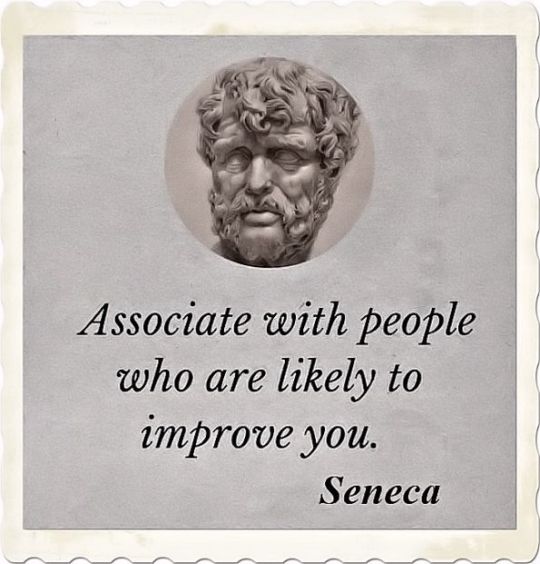
100 super worthy quotes 100 super worthy quotes, another post full of great valuable quotes and aphorisms selected among the best authors ever by our chief editor Carl William Brown It is a profitable thing, if one is wise, to seem foolish. Aeschylus If there is meaning in life at all, then there must be meaning in suffering. Viktor Frankl I have never gotten over the trauma of coming into the world, I have never liked the stupidity of the universe, let alone if I will ever be able to accept my mother's death. Carl William Brown The optimist proclaims that we live in the best of all possible worlds; and the pessimist fears this is true. James Branch Cabell God is a comedian playing to an audience that is too afraid to laugh. Voltaire The man who speaks to you of sacrifice, speaks of slaves and masters. And intends to be the master. Ayn Rand There is nothing more awful, insulting, and depressing than banality. Anton Chekhov What people commonly call fate is mostly their own stupidity. Arthur Schopenhauer I feel completely detached from any country, any group. I am a metaphysically displaced person. Emil M. Cioran In order to understand the world, one has to turn away from it on occasion. Albert Camus In such a stupid and cruel world, only imbeciles, selfish and devoid of any empathy, can find themselves at ease, also hoping to live a long time! Carl William Brown He lit a lamp in broad daylight and said, as he went about, "I am looking for a human. Diogenes of Sinope Meaningful silence is better than meaningless words. Pythagoras Man is quite insane. He wouldn't know how to create a maggot, and he creates Gods by the dozen. Michel de Montaigne

Happy people read quotes Women are the real architects of society. Harriet Beecher Stowe The closer to the truth, the better the lie, and the truth itself, when it can be used, is the best lie. Isaac Asimov Vulgus (Mundus o Populus) vult decipi, ergo decipiatur. (The world wants to be deceived, and so it is.) Latin Saying Without "ethical culture", there is no salvation for humanity. Albert Einstein You can't imagine how stupid the whole world has grown nowadays. Nikolai Gogol The price good men pay for indifference to public affairs is to be ruled by evil men. Plato One of the greatest problems of our time is that many. are schooled but few are educated. Thomas More Any idiot can face a crisis; it's this day-to-day living that wears you out. Anton Chekhov People will do anything, no matter how absurd, in order to avoid facing their own soul. One does not become enlightened by imagining figures of light, but by making the darkness conscious. Carl Jung It is stupidity rather than courage to refuse to recognize danger when it is close upon you. Arthur Conan Doyle Never interrupt your enemy, when he is making a mistake. Napoleon Bonaparte The only real goal that can have a certain value for our stupid and insignificant existence is to lose it forever. Carl William Brown When people talk listen completely. Don’t be thinking what you’re going to say. Most people never listen. Nor do they observe. Ernest Hemingway The tragedy of life is that it gives us wisdom only when it has stolen youth Will Durant Force governs the world (unfortunately!) and not knowing: therefore whoever rules it can and usually is ignorant. Vittorio Alfieri
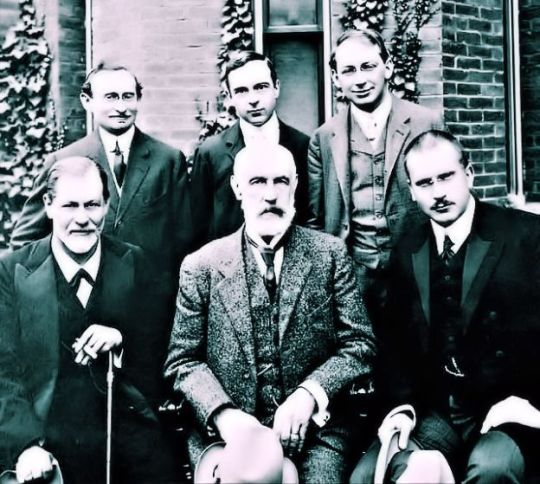
100 worthy aphorisms Competition is the law of the jungle, but cooperation is the law of civilization. Peter Kropotkin What if culture itself is nothing but a halt, a break, a respite, in the pursuit of barbarity? Slavoj Žižek The world is full of willing people; some willing to work, the rest willing to let them. Robert Frost Doesn't surprise me that Christ our Lord preferred to live with prostitutes and sinners, seeing I go in for that myself. Johann Wolfgang Friedrich von Goethe Strong thoughts are iron nails driven in the mind, that nothing can draw out. Denis Diderot A man who does not dissent is a seed that will never grow. Bertrand Russell To live is to suffer, to survive is to find some meaning in the suffering. Friedrich Nietzsche Time and space are the stupidest, most tragic and atrocious things that can concern us. Carl William Brown Man is insatiable for power; he is infantile in his desires and, always discontented with what he has, loves only what he has not. People complain of the despotism of princes; they ought to complain of the despotism of man. Joseph de Maistre I myself must also say I believe it is true that in the end humanitarianism will triumph; only I fear that at the same time the world will be one big hospital and each person will be the other person's humane keeper. Johann Wolfgang von Goethe There are worse crimes than burning books. One of them is not reading them. Joseph Brodsky The history of the world's great leaders is often the story of human folly. Voltaire The only thing necessary for the triumph of evil is for good men to do nothing. Edmund Burke Be alone, that is the secret of invention: be alone, that is when ideas are born. Nikola Tesla Bad temper is its own safety valve. He who can bark does not bite. Agatha Christie The happiness of your life depends upon the quality of your thoughts. Marcus Aurelius This place is a dream. Only a sleeper considers it real. Then death comes like dawn, and you wake up laughing at what you thought was your grief. Rumi Life not lived is a disease from which one can die. Carl Gustav Jung Some people have no idea what they're doing, and a lot of them are really good at it. George Carlin The poet sees, at the same time and from a single point, what is visible to two, in isolation. Boris Pasternak

Worthy and valuable quotes Life begins on the other side of despair. Jean-Paul Sartre Wealth is the slave of a wise man. The master of a fool. Seneca A man is the sum of his misfortunes. One day you'd think misfortune would get tired but then time is your misfortune. William Faulkner To accomplish great things, we must not only act, but also dream; not only plan, but also believe. Anatole France I think the devil doesn't exist, but man has created him, he has created him in his own image and likeness. Fyodor Dostoevsky Death smiles at us all; all a man can do is smile back. Marcus Aurelius On the verge of death he remembered his mother who was waiting for him in the reality that does not exist and almost pleased he consoled himself. Carl William Brown Awareness of ignorance is the beginning of wisdom. Socrates Women are meant to be loved, not understood. Oscar Wilde Persons unmask their evilest qualities when they do quarrel. George Herbert A student of Buddhism tries to unlearn something daily. Alan Watts Everyone gets the experience. Some get the lesson. T. S. Eliot To be yourself in a world that is constantly trying to make you something else is the greatest accomplishment. Ralph Waldo Emerson We are all like the bright moon, we still have our darker side. Khalil Gibran We are all born originals and die copies. Carl Gustav Jung I have a theory that the moment one gives close attention to anything, even a blade of grass, it becomes a mysterious, awesome, indescribably magnificent world in itself. Henry Miller The high-minded man must care more for the truth than for what people think. Aristotle Bees don’t waste their time explaining to flies that honey is better than shit! Anonymous I would rather excel in the knowledge of what is excellent, than in the extent my power and possessions. Plutarch In this super sea of shit, we are all in the same boat, but those who row are always the same. Carl William Brown

Quote against warfare Artificial intelligence will be Man's most important achievement. Too bad it could be the last. Stephen Hawking Three may keep a secret, if two of them are dead. Benjamin Franklin If you don't have ideas, read. If you have ideas, but can't articulate them, write. If you have ideas, and have the clarity to execute, build. Dan Koe Knowledge is no guarantee of good behavior, but ignorance is a virtual guarantee of bad behavior. Martha C. Nussbaum. When reading, we don't fall in love with the characters' appearance. We fall in love with their words, their thoughts, and their hearts. We fall in love with their souls. Anonymous The best things can only be achieved with maximum effort. Goethe Nature is busy creating absolutely unique individuals, whereas culture has invented a single mold to which all must conform. It is grotesque. U. G. Krishnamurti The mind is its own place, and in itself can make a heaven of hell, a hell of heaven.. John Milton It is dangerous to be right in matters where established men are wrong. Voltaire What is called a reason for living is also an excellent reason for dying. Albert Camus The bad thing of war is, that it makes more evil people than it can take away. Immanuel Kant Reason connot defeat emotion, an emotion can only be displaced or overcome by a stronger emotion. Baruch Spinoza Compassion for our parents is the true sign of maturity. Anais Nin You only know me as you see me, not as I actually am. Immanuel Kant The closer to the truth, the better the lie, and the truth itself, when it can be used, is the best lie. Isaac Asimov The tragedy of life is that it gives us wisdom only when it has stolen youth Will Durant The tragedy of life is that it gives us wisdom only when it has stolen youth Will Durant The enjoyment of power inevitably corrupts the judgment of reason, and perverts its liberty. Immanuel Kant Let us not burden our remembrances With a heaviness that's gone. William Shakespeare Man is born free and everywhere he is in chains. Rousseau

Read quotes and relax The smart way to keep people passive and obedient is to strictly limit the spectrum of acceptable opinion, but allow very lively debate within that spectrum. Noam Chomsky Those who are right do not argue. Those who argue are not right. Lao Tzu We live for books. A sweet mission in this world dominated by disorder and decay. Umberto Eco The stupidity of people comes from having an answer for everything. Milan Kundera When I was young, I admired clever people. Now that I am old, I admire kind people. Abraham Joshua Heschel The great use of life is to spend it for something that will outlast it. William James Comprehension, inventiveness, direction, and criticism: intelligence is contained in these four words. Alfred Binet Patience is waiting. Not passively waiting. That is laziness. But to keep going when the going is hard and slow - that is patience. The two most powerful warriors are patience and time. Leo Tolstoy I am sure that if the mothers of various nations could meet, there would be no more wars. E. M. Forster Geniuses are like thunderstorms. They go against the wind, terrify people, cleanse the air. Soren Kierkegaard Books for general reading always smell badly; the odor of common people hangs about them. Friedrich Nietzsche Don’t miss these other similar posts: Wise quotes from the Ancients 100 golden quotes and aphorisms 100 wonderful quotes and aphorisms 100 admirable quotes and aphorisms 100 magnificent quotes and aphorisms 100 brilliant quotes and aphorisms 100 famous quotes and aphorisms 100 memorable quotes and aphorisms 100 excellent quotes and aphorisms 100 top great quotes and aphorisms 100 great quotes on love Great and famous philosophy quotes Quotes by authors Quotes by arguments Thoughts and reflections Essays with quotes Read the full article
#100#Alfieri#aphorisms#authors#Brown#Camus#caring#Chomsky#Diderot#Eco#Einstein#Goethe#Gogol#great#Jung#Kant#Kierkegaard#literature#maxims#Montaigne#Nietzsche#Plato#quotations#quotes#Russell#sayings#Seneca#Tolstoy#valuable#voltaire
4 notes
·
View notes
Text
Not Death will do us part!

"You know you can't marry Eugène!" said Hortense, looking at me sternly with her big blue eyes. "Do you know, Adèle, what he once told me...that I should not hope to marry for love!" She straightened her back and looked down at me in a very grown-up way. "Eugène will one day marry a foreign princess. For political reasons. He's the son of the First Consul! Who knows, maybe Eugène will even marry an English princess...then there would finally be peace between England and France". She raised her finger in front of me. "So don't fall in love with Eugène, you little fool...it's absolutely pointless!" What Hortense said frightened me. And Moira had warned me: "Don't let them know that Eugène is courting you! The girls will make your life hell. They are jealous...oh lord!" I shook my head slightly as I said to Hortense: "I'm not in love with Eugène! But I like him very much. He's so charming, like my brother Dominique!" Hortense finally smiled. She turned to the other girls and said: "You see, there's no danger for you stupid geese. Our Adèle is not in love with him! You can continue to adore my brother..."
But I could tell that Églée wasn't happy with that. She stared at me as I sat down to continue with my embroidery. "Adéle," I looked at her. "...do you know that you're not allowed to kiss a man on the mouth if you can't have him? I mean...really kiss him!" She stuck her tongue out between her lips. The other girls giggled. I shrugged. Églée continued to tease. "...if a man puts his tongue in your mouth, you'll fall in love with him. But if he can't marry you, you'll be unhappy!" Aimée sighed. "God, leave her alone! The chick doesn't know anything about this! She'd better be careful that the guy doesn't put anything else in her, otherwise she'll be even more unhappy."
It was true! I was almost twenty years old and knew very little about married life with a man. That was about to change. But in a terrible way!
It was in November 1801, that one of our young ladies, Aimée Leclerc, was married. She married General Oudinot, whom she had never seen before and whom she had not chosen. Églée was luckier. She got General Ney, a tall young officer with fiery red hair! Hortense Beauharnais was forced to marry her step-uncle Louis Bonaparte, even though she was actually in love with General Duroc, her stepfather's adjutant. So she was not spared either!
Before I could even guess my fate, a message from my family reached me in the springtime of 1802. Madame Campan asked me to come into her study. "Sit down, child!" Madame Campan looked at me sadly, so I become afraid. "I received a letter from your mother. Your father is seriously ill. You must go home, Adèle." She gave me the letter, which was also addressed to me. I recognized my mother's handwriting, the words danced before my eyes. "Papa"..."stroke"..."immobilized"..."come home, Adèle!" I began to cry. What should I do? Madame Campan stood up and took me in her arms. "Miss O'Malley will accompany you on your journey south. Be strong, my child!"
Ten days later, Moira and I arrived in my hometown Aire-sur-l'Adour. Maman welcomed me in black. "Papa is upstairs. Go to him, he's waiting for you!" I was relieved - he was still alive! However, my poor Papa looked terrible, he could no longer speak or walk. I sat down by his bed and stroked his hand. A few moments later Maman entered the room with an older Monsieur who I didn't know. He was elegantly dressed, holding a tricorn hat and a walking stick. I saw lace cuffs and a signet ring. He wore a white powdered wig. "This is Monsieur Duchâtel," Maman introduced the older man to me. "...he's a friend of your father. Monsieur Duchâtel is supporting us in this terrible time, we owe him everything. You too, my daughter! Monsieur Duchâtel has asked for your hand in marriage, Adèle. I have agreed, ...in the name of your father!"
"What???"
"Yes. You'll marry Monsieur Duchâtel, Adèle!"
I don't know how much time passed before I awoke from my nervous breakdown. Moira was with me. I was lying on the couch in the drawing room. Maman and Dominique were standing next to the door. The Monsieur was not here. Dominique came to me, he had grown up, a handsome blonde man! My brother knelt down and took my hand. "Adèle,...I'm so glad you're here!" Maman still stood at the door, she didn't move, but said: "Adèle...you must marry Monsieur Duchâtel...otherwise we'll all end up in the poorhouse. It's that what you want? Will you ruin your family? Will you kill your Papa...?" I looked at Dominique. He was crying! I was so shocked that I couldn't speak. Moira approached my mother. "Madame Papin, it would be good if you spoke to me about this matter. Adèle is too exhausted. Please!" Maman nodded and they both left the room. I hugged my brother Dominique. We both cried.
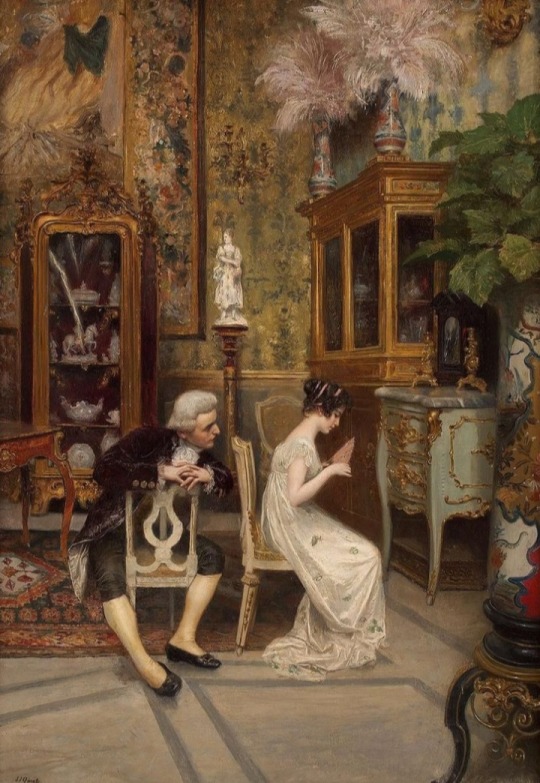
2 notes
·
View notes
Photo

REBELLION by Simon Scarrow (EAGLES OF EMPIRE 22)
AD.60 and Brittania is in chaos. Boudica has had a taste of victory against the formidable veterans in Camulodunum and she won’t stop now. How will Roman heroes Macro and Cato fare against the notorious Queen of the Britons?
A quick response to the rapidly advancing rebel forces, Governor Suetonius takes command leading his army to the besieged Londinium with prefect Cato and a mounted escort in tow. The grim reality of Britannia slipping deeper into chaos and hysteria becomes unmistakable as tribal warriors continue to swell the ranks of Boudica’s forces. Both Cato and Suetonius confront the sobering truth that minimal preparations have been made to confront a full-scale insurrection.
Meanwhile, in Londinium, a heart-wrenching revelation unfolds. Centurion Macro is among those missing following the Camulodunum massacre. Has Cato's loyal comrade, who has faced countless battles, met his ultimate challenge? As disaster looms, Cato readies himself for the next strategic move. Can he dare to hope that Macro, marked by battle and unflinching courage, has managed to evade these bloodthirsty rebels? In this pivotal military campaign, Cato knows that only one man he trusts stands beside him, and the fate of the Empire in Britannia hangs in the balance.
Book page: https://www.headline.co.uk/titles/simon-scarrow/rebellion-eagles-of-empire-22/9781472287076/
My Review: Note: you can read this book as a stand-alone but I think it’s a sort of follow-up to Death to the Emperor, the previous novel in this long series. Boudica’s rebellion is described in a lot of books but I think this one that describe is it could have been. It was gory, violent, sometime very cruel insurrection, a sort of guerrilla that nearly defeated Rome. The author did a good job in described the sense of confusion, the excitement, the violence. This age is not known for any type of Geneva treaty or piety, the Roman pietas is the sense of loyalty not any type of kindness The novel is fast paced, action packed, with some heartbreaking moments. There’s a lot violence and some scenes are a graphic description of what it was described by the historian so you’d better skip them if you are squeamish. I was happy to catch up with Cato and Marco, felt for them and hope to read soon their new story as the aftermath of the rebellion won’t be easy. This story kept me reading till late in the night as I wanted to be sure that my favourite characters were going to survive. The storytelling is excellent and it’s well researched. There’s a lot of attention to the details. Highly recommended. Many thanks to the publisher for this ARC, all opinions are mine
The Author: Simon Scarrow is a Sunday Times No. 1 bestselling author with several million copies of his books sold worldwide. After a childhood spent travelling the world, he pursued his great love of history as a teacher, before becoming a full-time writer. His Roman soldier heroes Cato and Macro made their debut in 2000 in UNDER THE EAGLE and have subsequently appeared in many bestsellers in the Eagles of the Empire series, including CENTURION, INVICTUS and DAY OF THE CAESARS. Many of the series have been Sunday Times bestsellers. REBELLION marks no.22 of Simon’s Eagles of the Empire Novels.
Simon Scarrow is also the author of a quartet of novels about the lives of the Duke of Wellington and Napoleon Bonaparte, YOUNG BLOODS, THE GENERALS, FIRE AND SWORD and THE FIELDS OF DEATH; a novel about the 1565 Siege of Malta, SWORD & SCIMITAR; HEARTS OF STONE, set in Greece during the Second World War; and PLAYING WITH DEATH, a contemporary thriller written with Lee Francis. He also wrote the novels ARENA and INVADER with T. J. Andrews. His first Berlin thriller, BLACKOUT set in WW2 Berlin and first published in 2021 was a Richard and Judy Book Club pick with DEAD OF NIGHT following to critical acclaim earlier in 2023.
Simon and ‘Eagle of the Empire’ series: Simon’s inspiration for the "Eagle of the Empire" series stems from a fascination with the Roman Empire's military and political intricacies. Scarrow's meticulous research and dedication to historical accuracy are evident in his works, where he skillfully weaves narratives around real historical events and figures. Simon has been inspired by his own life and experiences and sees himself in both his main characters Cato and Marco - Cato being who he was as a student and Marco who he has grown up to be. He has a knack for immersing readers in the ancient world and through his novels, he invites readers to embark on those journeys back in time, where empires clash in battles that have shaped the course of human history but encourages us to draw parallels to the political now through his stories of the then.
Website: https://www.simonscarrow.co.uk/ Twitter: https://twitter.com/SimonScarrow
2 notes
·
View notes
Text

" this is true - but i have never come back from the dead before. " there it was - the tentative smile, the little duck of his chin as he let the words fall from his lips, a small hint of glimmer in his eyes as he gave a gentle nudge towards something familiar. the way he'd use dark humor to deflect - the way sometimes, she'd laugh. " i had hoped... that would help lessen the wrath? "
though maceon hated the thought of rose in pain... for her eyes to release salty tears to stain beautiful cheeks, for her heart to ache, her nights drag on without sleep... there was something to be said for the knowledge of having been mourned. maceon never doubted his love for rose was true; but dysfunction was at it's finest whenever the pair of them were in the same room. the lost prince tried not to take too much of an ego inflation with the facts given. what little reassurance the promise of her grief provided in the moment, however, was gone as nearly as it were realized, and maceon's expression fell with his eyes, studying the ground.
worth it? had anything ever been worth a moment of the life he'd lived for years? he thought of his sister, his brothers - of the ortiz, and now, a slew of death on everyone's minds. " freedom isn't real, rose. " maceon finally provided, darkness now in his tone. " i have had to do things... no man should have to do. one of those, yes, was le- leaving you. " his voice broke finally, for he, too, had suffered in the loss of himself. maceon bonaparte was dead, by all understanding. " but not a day went on you were not on my mind. and i am as free as i can be. i do not answer to any court, i am a man of my own wealth. " stolen, as it were. " you know i would have never been happy... if i had stayed, and worked for them. would you have had me as i were then- a drunk, angry, jaded, cruel, fallen prince, king of nothing? "



for a moment and the first time ever since leaving spain for germany, rose regretted not going back home to france. it was never a regret she had faced before, for nothing left back in france for her except an overbearing father and she had lost everything in spain. germany had been a fresh, new start for her in her grief — and now here she learned that going back home would've freed her from the crushing pain grief brought her.
he was right there in front of her, speaking, breathing — existing just as she was and yet rose still felt as though she was looking at a ghost. perhaps it was because she hadn't laid eyes on him or even his likeness in so long. old paintings of him had been discarded in spain to make way for the new royals and what paintings of him she had done herself — she couldn't ever bear to look at.
he was right, this was a miracle. it was a miracle he was standing and by some strange, twist of fate — he was standing here before her. he was at the same place, in the same time, as she. was that a miracle, or was it by design ? rose watched as he took a step forward, and yet she found herself absolutely frozen in place.
" maceon . . . " she said his name so quietly, having said it for the first time in years. " i have been cross with you for far less then this, " the beauty jested, though there was still a fury in her eyes — it had begun to quell, for the sense that he was real was quickly taking over her heart. "i've missed you too, far greater then you'll ever know. " of course she missed him, but for her it had been a far different experience. he had been dead and not a thousand letters written or years spent looking for him would've brought him back to her and yet, all this time — he was only a letter away. the very thought infuriated rose. yes, he said he wrote, but rose seldom considered that to be enough. her standards were high, and he knew this of her.
" i spent so much time, mourning you, aching over the fact that i lost you, " she shook her head, the first several months after his death was the worst time of her life. " i cried to sleep for months until i could cry no more and that was still not enough, " the pain she felt in her chest on a daily basis had only subsided in the past couple of years and now — now it felt like it threatened to rip her apart all over again. " tell me it was worth it, " rose whispered, but it was a whisper laced with anger. laced with that fury she now held like a torch. the minister knew if she spoke any louder, tears would accompany the words. " tell me that breaking me apart was worth whatever freedom you found by leaving. " oh, how she hoped it was worth it, for if he had done this to her for nothing — hell hath no fury.
8 notes
·
View notes
Text
That one time Booker disrupted the celebrations for Napoléon’s 200th death day (May 5th, 2021) (also on ao3)
There were many things that Sébastien le Livre had planned for the 200th anniversary of Napoléon Bonaparte’s death. He’s had a lot of time to think about it: a whole half a century, as a matter of fact.
Last time had been in 1971, when he’d taken an especially keen liking to forging celebratory stamps. For the French postal service had released some special stamps celebrating the 150 years since Napoléon had died, and if there’s anything that Booker knows, it’s that stamp collectors will pay big time in order to get their collection complete.
It had taken him about three days to figure out the process, and over the course of the next years, he’d made enough stamps (but not too many) to keep in a locked and temperature regulated drawer, so that he could throw some onto the market every few years. (It’s a lot easier now with eBay, but he still likes the thrills of auctions, it makes him feel important).
This year, however, technology is in an entirely different place than it was in the beginning of the 1970s. And one thing that exists in 2021 that didn’t exist in 1971 is a specific song released by a Swedish band for the 19th edition of the annual Eurovision Song Contest.
He’d known then and there, while watching the show with the rest of the immortals, when the song had begun with the lyrics “My my, at Waterloo Napoleon did surrender.”
This is why Booker had taken up a job as a janitor at the Hôtel des Invalides at the beginning of the year, in order to disrupt the celebrations planned by the French government: the French president Emmanuel Macron will be present at the Hôtel to put down flowers by Napoléon’s tomb, accompanied by the Ministre des Armées Florence Parly, by the Chief of the Defence Staff François Lecointre and by none other than Jean-Christophe Napoléon Bonaparte, the current Imperial heir.
If, during the ceremony, a set of bluetooth speakers suddenly begin blasting the Abba song at 5:47 pm, it won’t be Booker’s fault at all.
After all, when posterity knows exactly which minute the Emperor drew his last breath, it’d be a waste to not use that opportunity to haunt and mock him one last time...
#booker#sebastien le livre#nevermindirah#ngl this was absolutely STUPID#but happy death day to bonaparte!!!!#the old guard
167 notes
·
View notes
Text
Anonymous asked: I enjoyed reading your posts about Napoleon’s death and it’s quite timely given its the 200th anniversary of his death this year in May. I was wondering, because you know a lot about military history (your served right? That’s cool to fly combat helicopters) and you live in France but aren’t French, what your take was on Napoleon and how do the French view him? Do they hail him as a hero or do they like others see him like a Hitler or a Stalin? Do you see him as a hero or a villain of history?
5 May 1821 was a memorable date because Napoleon, one of the most iconic figures in world history, died while in bitter exile on a remote island in the South Atlantic Ocean. Napoleon Bonaparte, as you know rose from obscure soldier to a kind of new Caesar, and yet he remains a uniquely controversial figure to this day especially in France. You raise interesting questions about Napoleon and his legacy. If I may reframe your questions in another way. Should we think of him as a flawed but essentially heroic visionary who changed Europe for the better? Or was he simply a military dictator, whose cult of personality and lust for power set a template for the likes of Hitler?

However one chooses to answer this question can we just - to get this out of the way - simply and definitively say that Napoleon was not Hitler. Not even close. No offence intended to you but this is just dumb ahistorical thinking and it’s a lazy lie. This comparison was made by some in the horrid aftermath of the Second World War but only held little currency for only a short time thereafter. Obviously that view didn’t exist before Hitler in the 19th Century and these days I don’t know any serious historian who takes that comparison seriously.
I confess I don’t have a definitive answer if he was a hero or a villain one way or the other because Napoleon has really left a very complicated legacy. It really depends on where you’re coming from.
As a staunch Brit I do take pride in Britain’s victorious war against Napoleonic France - and in a good natured way rubbing it in the noses of French friends at every opportunity I get because it’s in our cultural DNA and it’s bloody good fun (why else would we make Waterloo train station the London terminus of the Eurostar international rail service from its opening in 1994? Or why hang a huge gilded portrait of the Duke of Wellington as the first thing that greets any visitor to the residence of the British ambassador at the British Embassy?). On a personal level I take special pride in knowing my family ancestors did their bit on the battlefield to fight against Napoleon during those tumultuous times. However, as an ex-combat veteran who studied Napoleonic warfare with fan girl enthusiasm, I have huge respect for Napoleon as a brilliant military commander. And to makes things more weird, as a Francophile resident of who loves living and working in France (and my partner is French) I have a grudging but growing regard for Napoleon’s political and cultural legacy, especially when I consider the current dross of political mediocrity on both the political left and the right. So for me it’s a complicated issue how I feel about Napoleon, the man, the soldier, and the political leader.

If it’s not so straightforward for me to answer the for/against Napoleon question then it It’s especially true for the French, who even after 200 years, still have fiercely divided opinions about Napoleon and his legacy - but intriguingly, not always in clear cut ways.
I only have to think about my French neighbours in my apartment building to see how divisive Napoleon the man and his legacy is. Over the past year or so of the Covid lockdown we’ve all gotten to know each other better and we help each other. Over the Covid year we’ve gathered in the inner courtyard for a buffet and just lifted each other spirits up.
One of my neighbours, a crusty old ex-general in the army who has an enviable collection of military history books that I steal, liberate, borrow, often discuss military figures in history like Napoleon over our regular games of chess and a glass of wine. He is from very old aristocracy of the ancien regime and whose family suffered at the hands of ‘madame guillotine’ during the French Revolution. They lost everything. He has mixed emotions about Napoleon himself as an old fashioned monarchist. As a military man he naturally admires the man and the military genius but he despises the secularisation that the French Revolution ushered in as well as the rise of the haute bourgeois as middle managers and bureaucrats by the displacement of the aristocracy.
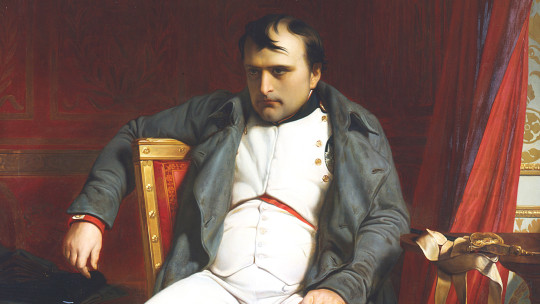
Another retired widowed neighbour I am close to, and with whom I cook with often and discuss art, is an active arts patron and ex-art gallery owner from a very wealthy family that came from the new Napoleonic aristocracy - ie the aristocracy of the Napoleonic era that Napoleon put in place - but she is dismissive of such titles and baubles. She’s a staunch Republican but is happy to concede she is grateful for Napoleon in bringing order out of chaos. She recognises her own ambivalence when she says she dislikes him for reintroducing slavery in the French colonies but also praises him for firmly supporting Paris’s famed Comédie-Française of which she was a past patron.
Another French neighbour, a senior civil servant in the Elysée, is quite dismissive of Napoleon as a war monger but is grudgingly grateful for civil institutions and schools that Napoleon established and which remain in place today.
My other neighbours - whether they be French families or foreign expats like myself - have similarly divisive and complicated attitudes towards Napoleon.

In 2010 an opinion poll in France asked who was the most important man in French history. Napoleon came second, behind General Charles de Gaulle, who led France from exile during the German occupation in World War II and served as a postwar president.
The split in French opinion is closely mirrored in political circles. The divide is generally down political party lines. On the left, there's the 'black legend' of Bonaparte as an ogre. On the right, there is the 'golden legend' of a strong leader who created durable institutions.
Jacques-Olivier Boudon, a history professor at Paris-Sorbonne University and president of the Napoléon Institute, once explained at a talk I attended that French public opinion has always remained deeply divided over Napoleon, with, on the one hand, those who admire the great man, the conqueror, the military leader and, on the other, those who see him as a bloodthirsty tyrant, the gravedigger of the revolution. Politicians in France, Boudon observed, rarely refer to Napoleon for fear of being accused of authoritarian temptations, or not being good Republicans.
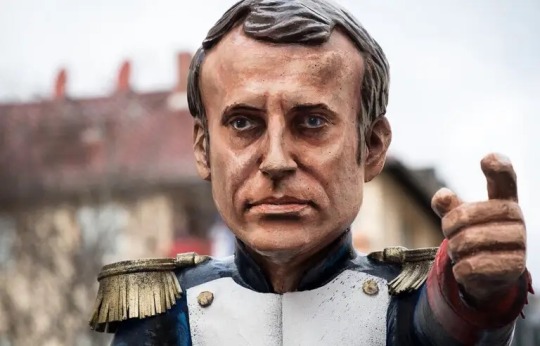
On the left-wing of French politics, former prime minister Lionel Jospin penned a controversial best selling book entitled “the Napoleonic Evil” in which he accused the emperor of “perverting the ideas of the Revolution” and imposing “a form of extreme domination”, “despotism” and “a police state” on the French people. He wrote Napoleon was "an obvious failure" - bad for France and the rest of Europe. When he was booted out into final exile, France was isolated, beaten, occupied, dominated, hated and smaller than before. What's more, Napoleon smothered the forces of emancipation awakened by the French and American revolutions and enabled the survival and restoration of monarchies. Some of the legacies with which Napoleon is credited, including the Civil Code, the comprehensive legal system replacing a hodgepodge of feudal laws, were proposed during the revolution, Jospin argued, though he acknowledges that Napoleon actually delivered them, but up to a point, "He guaranteed some principles of the revolution and, at the same time, changed its course, finished it and betrayed it," For instance, Napoleon reintroduced slavery in French colonies, revived a system that allowed the rich to dodge conscription in the military and did nothing to advance gender equality.
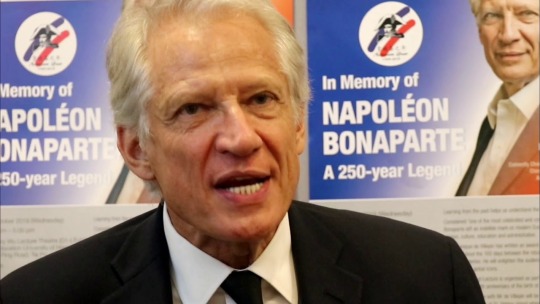
At the other end of the spectrum have been former right-wing prime minister Dominique de Villepin, an aristocrat who was once fancied as a future President, a passionate collector of Napoleonic memorabilia, and author of several works on the subject. As a Napoleonic enthusiast he tells a different story. Napoleon was a saviour of France. If there had been no Napoleon, the Republic would not have survived. Advocates like de Villepin point to Napoleon’s undoubted achievements: the Civil Code, the Council of State, the Bank of France, the National Audit office, a centralised and coherent administrative system, lycées, universities, centres of advanced learning known as école normale, chambers of commerce, the metric system, and an honours system based on merit (which France has to this day). He restored the Catholic faith as the state faith but allowed for the freedom of religion for other faiths including Protestantism and Judaism. These were ambitions unachieved during the chaos of the revolution. As it is, these Napoleonic institutions continue to function and underpin French society. Indeed, many were copied in countries conquered by Napoleon, such as Italy, Germany and Poland, and laid the foundations for the modern state.
Back in 2014, French politicians and institutions in particular were nervous in marking the 200th anniversary of Napoleon's exile. My neighbours and other French friends remember that the commemorations centred around the Chateau de Fontainebleau, the traditional home of the kings of France and was the scene where Napoleon said farewell to the Old Guard in the "White Horse Courtyard" (la cour du Cheval Blanc) at the Palace of Fontainebleau. (The courtyard has since been renamed the "Courtyard of Goodbyes".) By all accounts the occasion was very moving. The 1814 Treaty of Fontainebleau stripped Napoleon of his powers (but not his title as Emperor of the French) and sent him into exile on Elba. The cost of the Fontainebleau "farewell" and scores of related events over those three weekends was shouldered not by the central government in Paris but by the local château, a historic monument and UNESCO World Heritage site, and the town of Fontainebleau.
While the 200th anniversary of the French Revolution that toppled the monarchy and delivered thousands to death by guillotine was officially celebrated in 1989, Napoleonic anniversaries are neither officially marked nor celebrated. For example, over a decade ago, the president and prime minister - at the time, Jacques Chirac and Dominque de Villepin - boycotted a ceremony marking the 200th anniversary of the battle of Austerlitz, Napoleon's greatest military victory. Both men were known admirers of Napoleon and yet political calculation and optics (as media spin doctors say) stopped them from fully honouring Napoleon’s crowning military glory.
Optics is everything. The division of opinion in France is perhaps best reflected in the fact that, in a city not shy of naming squares and streets after historical figures, there is not a single “Boulevard Napoleon” or “Place Napoleon” in Paris. On the streets of Paris, there are just two statues of Napoleon. One stands beneath the clock tower at Les Invalides (a military hospital), the other atop a column in the Place Vendôme. Napoleon's red marble tomb, in a crypt under the Invalides dome, is magnificent, perhaps because his remains were interred there during France's Second Empire, when his nephew, Napoleon III, was on the throne.
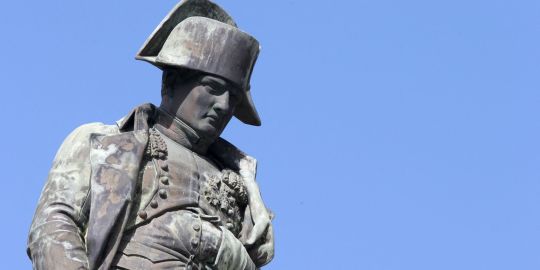
There are no squares, nor places, nor boulevards named for Napoleon but as far as I know there is one narrow street, the rue Bonaparte, running from the Luxembourg Gardens to the River Seine in the old Latin Quarter. And, that, too, is thanks to Napoleon III. For many, and I include myself, it’s a poor return by the city to the man who commissioned some of its most famous monuments, including the Arc de Triomphe and the Pont des Arts over the River Seine.
It's almost as if Napoleon Bonaparte is not part of the national story.
How Napoleon fits into that national story is something historians, French and non-French, have been grappling with ever since Napoleon died. The plain fact is Napoleon divides historians, what precisely he represents is deeply ambiguous and his political character is the subject of heated controversy. It’s hard for historians to sift through archival documents to make informed judgements and still struggle to separate the man from the myth.
One proof of this myth is in his immortality. After Hitler’s death, there was mostly an embarrassed silence; after Stalin’s, little but denunciation. But when Napoleon died on St Helena in 1821, much of Europe and the Americas could not help thinking of itself as a post-Napoleonic generation. His presence haunts the pages of Stendhal and Alfred de Vigny. In a striking and prescient phrase, Chateaubriand prophesied the “despotism of his memory”, a despotism of the fantastical that in many ways made Romanticism possible and that continues to this day.
The raw material for the future Napoleon myth was provided by one of his St Helena confidants, the Comte de las Cases, whose account of conversations with the great man came out shortly after his death and ran in repeated editions throughout the century. De las Cases somehow metamorphosed the erstwhile dictator into a herald of liberty, the emperor into a slayer of dynasties rather than the founder of his own. To the “great man” school of history Napoleon was grist to their mill, and his meteoric rise redefined the meaning of heroism in the modern world.
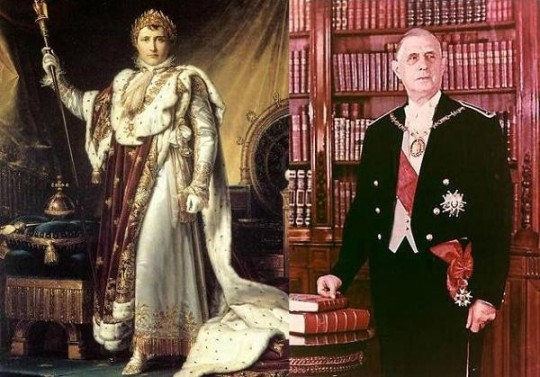
The Marxists, for all their dislike of great men, grappled endlessly with the meaning of the 18th Brumaire; indeed one of France’s most eminent Marxist historians, George Lefebvre, wrote what arguably remains the finest of all biographies of him.
It was on this already vast Napoleon literature, a rich terrain for the scholar of ideas, that the great Dutch historian Pieter Geyl was lecturing in 1940 when he was arrested and sent to Buchenwald. There he composed what became one of the classics of historiography, a seminal book entitled Napoleon: For and Against, which charted how generations of intellectuals had happily served up one Napoleon after another. Like those poor souls who crowded the lunatic asylums of mid-19th century France convinced that they were Napoleon, generations of historians and novelists simply could not get him out of their head.
The debate runs on today no less intensely than in the past. Post-Second World War Marxists would argue that he was not, in fact, revolutionary at all. Eric Hobsbawm, a notable British Marxist historian, argued that ‘Most-perhaps all- of his ideas were anticipated by the Revolution’ and that Napoleon’s sole legacy was to twist the ideals of the French Revolution, and make them ‘more conservative, hierarchical and authoritarian’.

This contrasts deeply with the view William Doyle holds of Napoleon. Doyle described Bonaparte as ‘the Revolution incarnate’ and saw Bonaparte’s humbling of Europe’s other powers, the ‘Ancien Regimes’, as a necessary precondition for the birth of the modern world. Whatever one thinks of Napoleon’s character, his sharp intellect is difficult to deny. Even Paul Schroeder, one of Napoleon’s most scathing critics, who condemned his conduct of foreign policy as a ‘criminal enterprise’ never denied Napoleon’s intellect. Schroder concluded that Bonaparte ‘had an extraordinary capacity for planning, decision making, memory, work, mastery of detail and leadership’. The question of whether Napoleon used his genius for the betterment or the detriment of the world, is the heart of the debate which surrounds him.
France's foremost Napoleonic scholar, Jean Tulard, put forward the thesis that Bonaparte was the architect of modern France. "And I would say also pâtissier [a cake and pastry maker] because of the administrative millefeuille that we inherited." Oddly enough, in North America the multilayered mille-feuille cake is called ‘a napoleon.’ Tulard’s works are essential reading of how French historians have come to tackle the question of Napoleon’s legacy. He takes the view that if Napoleon had not crushed a Royalist rebellion and seized power in 1799, the French monarchy and feudalism would have returned, Tulard has written. "Like Cincinnatus in ancient Rome, Napoleon wanted a dictatorship of public salvation. He gets all the power, and, when the project is finished, he returns to his plough." In the event, the old order was never restored in France. When Louis XVIII became emperor in 1814, he served as a constitutional monarch.
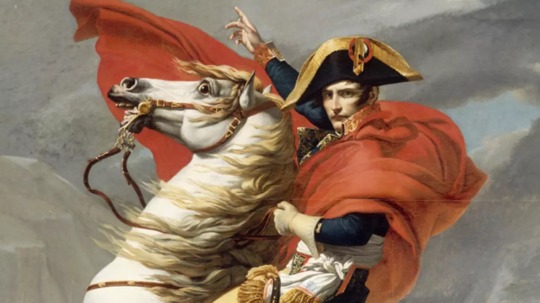
In England, until recently the views on Napoleon have traditionally less charitable and more cynical. Professor Christopher Clark, the notable Cambridge University European historian, has written. "Napoleon was not a French patriot - he was first a Corsican and later an imperial figure, a journey in which he bypassed any deep affiliation with the French nation," Clark believed Napoleon’s relationship with the French Revolution is deeply ambivalent.
Did he stabilise the revolutionary state or shut it down mercilessly? Clark believes Napoleon seems to have done both. Napoleon rejected democracy, he suffocated the representative dimension of politics, and he created a culture of courtly display. A month before crowning himself emperor, Napoleon sought approval for establishing an empire from the French in a plebiscite; 3,572,329 voted in favour, 2,567 against. If that landslide resembles an election in North Korea, well, this was no secret ballot. Each ‘yes’ or ‘no’ was recorded, along with the name and address of the voter. Evidently, an overwhelming majority knew which side their baguette was buttered on.
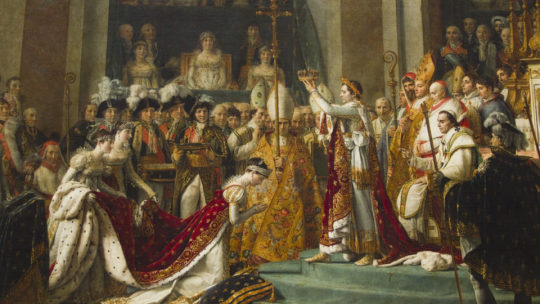
His extravagant coronation in Notre Dame in December 1804 cost 8.5 million francs (€6.5 million or $8.5 million in today's money). He made his brothers, sisters and stepchildren kings, queens, princes and princesses and created a Napoleonic aristocracy numbering 3,500. By any measure, it was a bizarre progression for someone often described as ‘a child of the Revolution.’ By crowning himself emperor, the genuine European kings who surrounded him were not convinced. Always a warrior first, he tried to represent himself as a Caesar, and he wears a Roman toga on the bas-reliefs in his tomb. His coronation crown, a laurel wreath made of gold, sent the same message. His icon, the eagle, was also borrowed from Rome. But Caesar's legitimacy depended on military victories. Ultimately, Napoleon suffered too many defeats.
These days Napoleon the man and his times remain very much in fashion and we are living through something of a new golden age of Napoleonic literature. Those historians who over the past decade or so have had fun denouncing him as the first totalitarian dictator seem to have it all wrong: no angel, to be sure, he ended up doing far more at far less cost than any modern despot. In his widely praised 2014 biography, Napoleon the Great, Andrew Roberts writes: “The ideas that underpin our modern world - meritocracy, equality before the law, property rights, religious toleration, modern secular education, sound finances, and so on - were championed, consolidated, codified and geographically extended by Napoleon. To them he added a rational and efficient local administration, an end to rural banditry, the encouragement of science and the arts, the abolition of feudalism and the greatest codification of laws since the fall of the Roman empire.”
Roberts partly bases his historical judgement on newly released historical documents about Napoleon that were only available in the past decade and has proved to be a boon for all Napoleonic scholars. Newly released 33,000 letters Napoleon wrote that still survive are now used extensively to illustrate the astonishing capacity that Napoleon had for compartmentalising his mind - he laid down the rules for a girls’ boarding school on the eve of the battle of Borodino, for example, and the regulations for Paris’s Comédie-Française while camped in the Kremlin. They also show Napoleon’s extraordinary capacity for micromanaging his empire: he would write to the prefect of Genoa telling him not to allow his mistress into his box at the theatre, and to a corporal of the 13th Line regiment warning him not to drink so much.
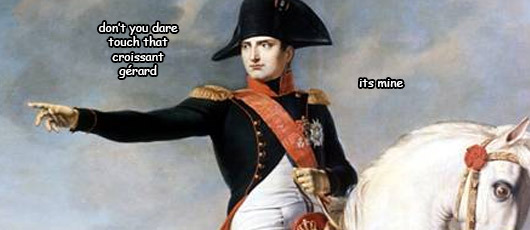
For me to have my own perspective on Napoleon is tough. The problem is that nothing with Napoleon is simple, and almost every aspect of his personality is a maddening paradox. He was a military genius who led disastrous campaigns. He was a liberal progressive who reinstated slavery in the French colonies. And take the French Revolution, which came just before Napoleon’s rise to power, his relationship with the French Revolution is deeply ambivalent. Did he stabilise it or shut it down? I agree with those British and French historians who now believe Napoleon seems to have done both.
On the one hand, Napoleon did bring order to a nation that had been drenched in blood in the years after the Revolution. The French people had endured the crackdown known as the 'Reign of Terror', which saw so many marched to the guillotine, as well as political instability, corruption, riots and general violence. Napoleon’s iron will managed to calm the chaos. But he also rubbished some of the core principles of the Revolution. A nation which had boldly brought down the monarchy had to watch as Napoleon crowned himself Emperor, with more power and pageantry than Louis XVI ever had. He also installed his relatives as royals across Europe, creating a new aristocracy. In the words of French politician and author Lionel Jospin, 'He guaranteed some principles of the Revolution and at the same time, changed its course, finished it and betrayed it.'
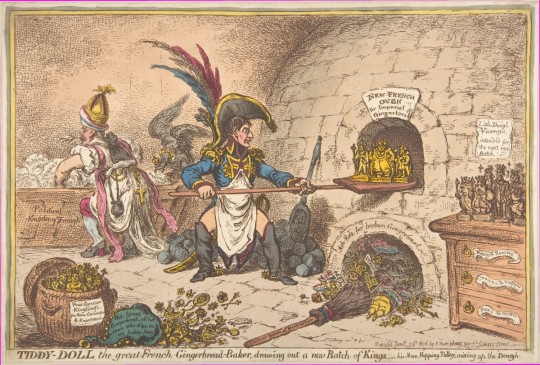
He also had a feared henchman in the form of Joseph Fouché, who ran a secret police network which instilled dread in the population. Napoleon’s spies were everywhere, stifling political opposition. Dozens of newspapers were suppressed or shut down. Books had to be submitted for approval to the Commission of Revision, which sounds like something straight out of George Orwell. Some would argue Hitler and Stalin followed this playbook perfectly. But here come the contradictions. Napoleon also championed education for all, founding a network of schools. He championed the rights of the Jews. In the territories conquered by Napoleon, laws which kept Jews cooped up in ghettos were abolished. 'I will never accept any proposals that will obligate the Jewish people to leave France,' he once said, 'because to me the Jews are the same as any other citizen in our country.'
He also, crucially, developed the Napoleonic Code, a set of laws which replaced the messy, outdated feudal laws that had been used before. The Napoleonic Code clearly laid out civil laws and due processes, establishing a society based on merit and hard work, rather than privilege. It was rolled out far beyond France, and indisputably helped to modernise Europe. While it certainly had its flaws – women were ignored by its reforms, and were essentially regarded as the property of men – the Napoleonic Code is often brandished as the key evidence for Napoleon’s progressive credentials. In the words of historian Andrew Roberts, author of Napoleon the Great, 'the ideas that underpin our modern world… were championed by Napoleon'.

What about Napoleon’s battlefield exploits? If anything earns comparisons with Hitler, it’s Bonaparte’s apparent appetite for conquest. His forces tore down republics across Europe, and plundered works of art, much like the Nazis would later do. A rampant imperialist, Napoleon gleefully grabbed some of the greatest masterpieces of the Renaissance, and allegedly boasted, 'the whole of Rome is in Paris.'
Napoleon has long enjoyed a stellar reputation as a field commander – his capacities as a military strategist, his ability to read a battle, the painstaking detail with which he made sure that he cold muster a larger force than his adversary or took maximum advantage of the lie of the land – these are stuff of the military legend that has built up around him. It is not without its critics, of course, especially among those who have worked intensively on the later imperial campaigns, in the Peninsula, in Russia, or in the final days of the Empire at Waterloo.
Doubts about his judgment, and allegations of rashness, have been raised in the context of some of his victories, too, most notably, perhaps, at Marengo. But overall his reputation remains largely intact, and his military campaigns have been taught in the curricula of military academies from Saint-Cyr to Sandhurst, alongside such great tacticians as Alexander the Great and Hannibal.
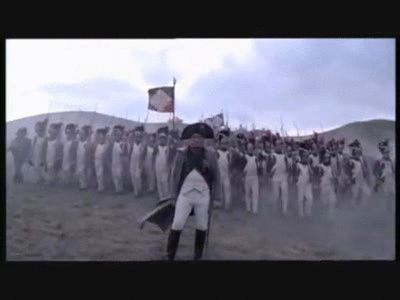
Historians may query his own immodest opinion that his presence on the battlefield was worth an extra forty thousand men to his cause, but it is clear that when he was not present (as he was not for most of the campaign in Spain) the French were wont to struggle. Napoleon understood the value of speed and surprise, but also of structures and loyalties. He reformed the army by introducing the corps system, and he understood military aspirations, rewarding his men with medals and honours; all of which helped ensure that he commanded exceptional levels of personal loyalty from his troops.
Yet, I do find it hard to side with the more staunch defenders of Napoleon who say his reputation as a war monger is to some extent due to British propaganda at the time. They will point out that the Napoleonic Wars, far from being Napoleon’s fault, were just a continuation of previous conflicts that arose thanks to the French Revolution. Napoleon, according to this analysis, inherited a messy situation, and his only real crime was to be very good at defeating enemies on the battlefield. I think that is really pushing things too far. I mean deciding to invade Spain and then Russia were his decisions to invade and conquer.
He was, by any measure, a genius of war. Even his nemesis the Duke of Wellington, when asked who the greatest general of his time was, replied: 'In this age, in past ages, in any age, Napoleon.'
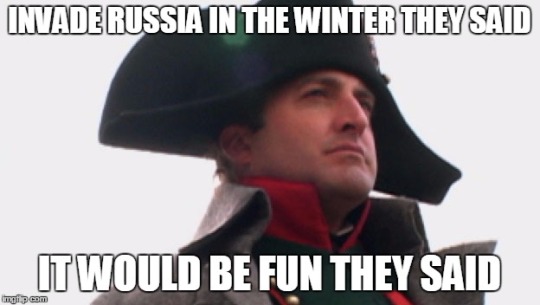
I will qualify all this and agree that Napoleon’s Russian campaign has been rightly held up as a fatal folly which killed so many of his men, but this blunder – epic as it was – should not be compared to Hitler’s wars of evil aggression. Most historians will agree that comparing the two men is horribly flattering to Hitler - a man fuelled by visceral, genocidal hate - and demeaning to Napoleon, who was a product of Enlightenment thinking and left a legacy that in many ways improved Europe.
Napoleon was, of course, no libertarian, and no pluralist. He would tolerate no opposition to his rule, and though it was politicians and civilians who imposed his reforms, the army was never far behind. But comparisons with twentieth-century dictators are well wide of the mark. While he insisted on obedience from those he administered, his ideology was based not on division or hatred, but on administrative efficiency and submission to the law. And the state he believed in remained stubbornly secular.
In Catholic southern Europe, of course, that was not an approach with which it was easy to acquiesce; and disorder, insurgency and partisan attacks can all be counted among the results. But these were principles on which the Emperor would not and could not give ground. If he had beliefs they were not religious or spiritual beliefs, but the secular creed of a man who never forgot that he owed both his military career and his meteoric political rise to the French Revolution, and who never quite abandoned, amidst the monarchical symbolism and the court pomp of the Empire, the republican dreams of his youth. When he claimed, somewhat ambiguously, after the coup of 18 Brumaire that `the Revolution was over’, he almost certainly meant that the principles of 1789 had at last been consummated, and that the continuous cycle of violence of the 1790s could therefore come to an end.
When the Empire was declared in 1804, the wording, again, might seem curious, the French being informed that the `Republic would henceforth be ruled by an Emperor’. Napoleon might be a dictator, but a part at least of him remained a son of the Enlightenment.
The arguments over Napoleon’s status will continue - and that in itself is a testament to the power of one of the most complex figures ever to straddle the world’s stage.
Will the fascination with Napoleon continue for another 200 years?
In France, at least, enthusiasm looks set to diminish. Napoleon and his exploits are scarcely mentioned in French schools anymore. Stéphane Guégan, curator of the Musée d'Orsay in Paris, which, among other First Empire artworks, houses a plaster model of Napoleon dressed as a Roman emperor astride a horse, has described France's fascination with him as ‘a national illness.’ He believes that the people who met him were fascinated by his charm. And today, even the most hostile to Napoleon also face this charm. So there is a difficulty to apprehend the duality of this character. As he wrote, “He was born from the revolution, he extended and finished it, and after 1804 he turns into a despot, a dictator.”

In France, Guégan aptly observes, there is a kind of nostalgia, not for dictatorship but for strong leaders. "Our age is suffering a lack of imagination and political utopia,"
Here I think Guégan is onto something. Napoleon’s stock has always risen or fallen according to the vicissitudes of world events and fortunes of France itself.
In the past, history was the study of great men and women. Today the focus of teaching is on trends, issues and movements. France in 1800 is no longer about Louis XVI and Napoleon Bonaparte. It's about the industrial revolution. Man does not make history. History makes men. Or does it? The study of history makes a mug out of those with such simple ideological driven conceits.
For two hundred years on, the French still cannot agree on whether Napoleon was a hero or a villain as he has swung like a pendulum according to the gravitational pull of historical events and forces.
The question I keep asking of myself and also to French friends with whom I discuss such things is what kind of Napoleon does our generation need?
Thanks for your question.
#question#ask#napoleon#french#french history#history#military history#bonaparte#france#historiography#republic#historians#personal
417 notes
·
View notes
Text
The Lady of the Lake
I always had the feeling that Auguste of Bavaria and her sister-in-law Hortense did not see eye to eye most of the time. In some letters that Auguste wrote to Eugène's old secretary Darnay years after her husband's death, she even makes herself quite clear about this. Fun fact: She refers to Hortense as »la Dame du Lac«, the Lady of the Lake. And I guess that’s precisely how overly romantic Hortense saw herself. Handing out magic swords to random wanderers passing by her castle at Lake Constance? Somebody found her calling.
All excerpts translated from »Auguste Amélie de Leuchtenberg. Lettres au baron Darnay« published by Christophe Pincemaïlle, Editions des Falaises, Rouen 2020
Ismaning, 13 August 1831
[...] It is sad that the Lady of the Lake has put herself in the position of being treated as almost a stranger and feared [? unclear] by those who would have been happy to console her, had she wished to conduct herself with prudence and dignity! I have probably been blamed for distancing myself from her, but I have been convinced for a long time that our principles are completely opposed. She wants to be perceived as an important person, to be talked about at all costs and to make herself famous by her intrigues, while I live withdrawn from the world and its grandeur, I exist only to fulfil the painful task that a beloved husband has left me [...].
Followed by a lot of »Woe is me«, because that was actually a discipline that both ladies excelled in if necessary. But as far as Hortense’s character is concerned and the way Eugène’s sister constantly craved everybody’s attention, absolutely and exclusively, as far as this is concerned I could not agree more. That is exactly the feeling that I get when I read Hortense’s memoirs.
Speaking of which – Hortense actually had some of her adventures published already in 1834 (»La Reine Hortense en Italie, en France et en Angleterre«). And Auguste read them. 😁
Rome, 8 January 1834
[...] I cannot understand the Lady of the Lake and her obsession to have her memoirs printed so that people will pay attention to her. She is incorrigible. Her way of paying her pensions is also something new. […]
Not sure what the novelty was that Auguste refers to in the last sentence. The pensions were probably those of Josephine’s old friends and servants – at Josephine’s death, her children had split up the duty to pay those pensions between themselves. Auguste was still paying those that had been Eugène’s share.
However indignant Auguste was about Hortense's intentions, she seems to have immediately purchased a copy of the book. She read it while still on her trip through Italy, where she also met Joseph Bonaparte's family, Julie Bonaparte-Clary and her daughter Charlotte, who had been married to Hortense's son Napoléon-Louis and had been a widow since 1831, after her husband had died of measles during the Carbonari uprising. Of course, this death also played a big role in Hortense’s book about those days.
Livorno, 2 July 1834
[...] I left the Countess de Survilliers [Julie Clary] still in the same state of suffering, which she bears with angelic patience. [...] It is always with pleasure that I visit these respectable people. Poor Princess Charlotte still feels very keenly the loss she has made. She is a charming person. [...]
I have read the Memoirs of the Lady of the Lake. She would have done better not to occupy the public with her, especially at the expense of others, for her family is not well treated in it, and what she says, among other things, about the illness of the late Prince, is quite untrue, and according to what Charlotte told me, the other facts are no more accurate. She promises us more, God knows what it will be.
LOL. Auguste, immediately fact-checking her sister-in-law! 😂
19 notes
·
View notes
Text
Historical fun facts part 2
Joséphine narrowly escaped death. Her husband, who had a horrible relationship to Joséphine, met his end at the guillotine during the French revolution and Joséphine was waiting for her execution in prison until an influential woman from the nobility managed to get her out of prison. They became friends shortly after.
Murat really had a tendency to rub his superiors the wrong way. Not only did he get kicked out of his careerpath to priesthood but also had to leave his first cavelry unit because of insubordination. Thanks to Napoleon however he managed to climb the ranks without any major problems.
Francis II. had four wives during his life. Three of them died pretty quickly, either shortly after the wedding, after giving birth or just a few years after getting married. Despite what one might think, Francis actually loved every single one of his wives and didn’t just marry to keep his status as emperor situated.
Napoleon Bonaparte was the human embodiment of “hard shell but soft core”. He was a big romantic deep inside, dreaming of a romance and a happy family life. He would give Joséphine her nickname and his love letters he sent to her are considered some of the most romantic writings in French literature.
Frederick William III. wrote a military march song when he was 10 years old, despite not being as talented in music as his father or great-uncle. He could play the organ, only the basics mostly, but that was about it. The military song he wrote saw it’s debut in 1835 and is still being used in the German military to this day.
Louise of Mecklenburg-Strelitz turned Frederick’s birthday into a personal holiday. When she learned that he had never once received birthday gifts in his life, let alone any kind of birthday celebration, she made sure to turn the third of August into the best day of their lives. She hated seeing other people live a life without fun, happiness and imagination, things she herself valued most and knowing that her own loved ones were robbed of that only made her even more determined to change exactly that.
Alexander I. actually hesitated to become tsar at first. His father was abusive towards him, treating him arbitrarily and distrustfully. When his father got assassinated he yelled “I don’t want this bloodstained crown!” but still became tsar not long after. His father’s murderers were captured but Alexander never punished them and ultimately set them free. ((NOTE: The Bernadotte part has been deleted. It turns out the whole tattoo thing wasn’t historically accurate at all (which sucks as it would have been fucking amazing if it were true lol). Big thanks to @suburbanbeatnik for pointing that out!))
#history post#fun facts#Napoleonic wars#Joséphine Bonaparte#Joachim Murat#Francis II.#Napoleon Bonaparte#Frederick William III.#Queen Louise#Alexander I.
74 notes
·
View notes
Text
The Ambiguous Political Relationship Between Lazare Carnot and Félix Le Peletier


On the surface, and even at a deeper ideological level, a lot divides these two men. Félix Le Peletier became one of the most well-known republican opponents of the Directoire period (among the famous opponents of this period are Bernard Metge, Xavier Audouin, Antonelle, Jean-Baptiste Drouet, Gracchus Babeuf, Victor Bach, although some of them were not aligned on the same ideals—for example, Metge was a liberal follower of the Constitution of Year III and anti-Babouvist), whereas Lazare Carnot was one of the most important members of the Directoire. Carnot was much more conservative on many points compared to Félix Le Peletier. However, their relationship is far more complex than simply being sworn enemies.
Here is an excerpt from their complex relationship: "In early November 1795, upon Carnot's recommendation, Félix Le Peletier was offered a position as a commissioner of the Directoire in the department of Seine-et-Oise. He rejected it with surprising virulence, informing Carnot that he regarded him as a tyrant and would continue to work to overthrow him. Carnot-Feulins, in his Histoire du Directoire, asserts, however, that Félix Le Peletier and his brother had close relations and frequently conversed. In 1796, when the Conjuration des Égaux was suppressed, Carnot led the operation. Yet, Félix Le Peletier escaped the police. Was this with Carnot's complicity? It seems hard to believe, especially since an archival document suggests that he narrowly escaped a police dragnet because he was detained in a café on Rue des Deux-Écus with a soldier. However, when in May 1796, he dared to publish his Second Reflections on the Present Moment, a strong indictment in favor of equality and common happiness, it is certain that he benefited from effective protection. At the same time, an arrest warrant signed by Carnot was issued for Félix Le Peletier, 'accused of conspiracy against the internal and external security of the Republic.' Despite this, Félix Le Peletier acted quite freely in Paris and Versailles. Was Carnot playing a double game? One might assume so. There is testimony to support this. A passage from the Mémoires sur Carnot by his son claims that during the Grenelle uprising, Carnot warned Félix Le Peletier the very morning that the police were about to intervene. Félix Le Peletier supposedly shared this warning with several others. Finally, the close ties between Carnot and Félix Le Peletier are evident during the Hundred Days. Carnot was appointed Minister of the Interior. On his recommendation, Félix Le Peletier was appointed commissioner of the Empire in the department of Seine-Inférieure, where he lived. Elected to the Chamber of Representatives after the May 1815 legislative elections, he went to Paris and was offered the Legion of Honor by Carnot, which he refused."
What is strange is that Félix Le Peletier never forgot that Carnot was responsible for the death of his friend Gracchus Babeuf (whom he was very close to). I believe that while Félix Le Peletier was a staunch activist, he did not believe in the death of a republican martyr and was prepared to continue living and fighting without abandoning his friends. After all, Félix Le Peletier accepted help from his childhood friend Saint-Jean d’Angely when he was persecuted by Bonaparte and nearly deported. So, he might have accepted help from Carnot as well, even though his friend Gracchus Babeuf had been condemned to death, for in any case, Félix could have done nothing.
What I personally find intriguing is Carnot's attitude. I mean, he clearly saw that Félix was not a real threat and decided to protect him. That is to his credit. Yet, he led a repression against the Babouvists, including Félix Le Peletier's friends. I get the impression that Carnot overestimated the "danger" posed by Gracchus and his Babouvist associates compared to other elements under the Directoire regime, and that’s why Carnot acted this way.
Perhaps this is one of the reasons why Gracchus (and Buonarotti) spared Carnot from most of the criticism, while he was virulent against Cochon, the Minister of Police, and Grisel, despite the terrible ordeals Gracchus endured, such as being transported in a metal cage from Paris to Vendôme. The reason may be that Carnot at least protected some of his friends, in addition to other reasons I’ve mentioned here. Indeed, in the last letter Gracchus sent to his friend Félix, he told him that he knew Félix would be spared, even though Gracchus was to be executed, as you can see here.
But the fact that Carnot wanted to recruit Félix Le Peletier offers a plausible explanation for why Émile Babeuf might have worked for Carnot, specifically on a mission during the Hundred Days, as shown here. Indeed, Émile Babeuf, like Félix Le Peletier, aligned with Bonaparte during the Hundred Days. Now, we know that Félix Le Peletier was a protector of the Babeuf family and very close to them (he considered them as a family, and vice versa, not to mention their shared political views on several points). So it’s likely that if Carnot wanted Félix Le Peletier to work for him, Félix could have served as an intermediary for Émile Babeuf to send a letter to Lazare Carnot. This now makes more sense to me, considering what happened between Carnot and Gracchus Babeuf.
Sources (about the excerpt) :
19 notes
·
View notes
Text
The two Robespierres have ceased to exist, but the tomb did not, by closing in on them, engulf all that was born of their blood. Their sister survives the horrible catastrophe of Thermidor: Charlotte Robespierre is still condemned to live for almost half a century, if feasting every day on heartbreaking memories and inexhaustible tears counts as living.
Charlotte Robespierre had received from nature the sweetest and loveliest of virtues. Without gall, without violent and hateful passions, she was always even-tempered, always affable in character. Her loving and sensitive heart could not understand that there were people who took pleasure in the misfortune of others; and yet no one had experienced it more cruelly than herself. The turbulent agitations of politics would have made her flee to the ends of the earth, if the ardent tenderness which tied her to her brothers had not kept her in her homeland. Passionate about the private life, she could never bring herself to leave it, and was always careful not to imitate those women who, forgetting the role that suits their sex, throw themselves madly and ridiculously into a career that is not made for them. So she played no part in the extraordinary events that signaled the time when her older brother was in power. A Madame Roland, or some other statesman-woman, will write you folios on what she has seen, on what she has done; but Charlotte Robespierre occupies herself with politics only as much as is necessary for her to follow her brothers with her eyes in the arena where they fight hand to hand with crime.
Arrested after the 9th of Thermidor, she was set free after a fortnight, as we shall see in her memoirs. She sought refuge with several of her friends, who rebuffed her, taking as their excuse the frightful proscription that weighed on everything that had to do with Robespierre. Finally, she knocked on the door of Citizen Mathon. That door opened for her; she was received with all the respect that was due to so many misfortunes. Citizen Mathon had been the friend of the two Robespierres; he was happy to be able to take in their sister, from then on she was the object of all his solicitude.
Mademoiselle Mathon, who loved Charlotte Robespierre like her mother, and who until the last breath of this unfortunate woman never ceased to lavish on her the most tender and attentive care, was only six years old when Charlotte took refuge with her dad. Raised under the eyes of Charlotte Robespierre, Mademoiselle Mathon made a sweet habit of seeing her, hearing her, loving her, and soon dedicated her existence to her. After the death of her father, who succumbed in 1827, she continued to live at home. You have to have seen them both in their interior to know how much they loved each other.
What shall I say about the life of Charlotte Robespierre? Nothing. This quiet and dark life flowed like a silent and unknown river which crosses deep solitudes, and will mingle its waters with those of the ocean without having bathed any inhabited river. Imagine a flower in the middle of the desert, which blooms, exhales sweet perfumes, withers and dies: such was Charlotte Robespierre. She lived in Paris; but Paris was for her only a solitude; Paris offered her only a desert of men, according to the magnificent expression of a great writer.
We will read in her memoirs how she obtained a pension from the First Consul Bonaparte. This pension was reduced after the arrival of the Bourbons. Charlotte Robespierre expected to lose it, and her astonishment was great when she learned that Louis XVIII kept it for her, reduced to 1200 francs. One will wonder with what intention the brother of Louis XVI was able to provide a pension to the sister of Maximilien Robespierre; and this question is quite natural; I addressed it to myself at first. After thinking about it, I could only see in the pension continued by Louis XVIII a way to shut Charlotte Robespierre's mouth. The Bourbons must have feared that she would write memoirs of her brother, that she would try to rehabilitate him in public opinion, and that she would show the absurdity of the calumnies which were directed against him. This fear alone could have sufficed to preserve for her, by a pension which Bonaparte had granted her only in consideration of her brothers, one of whom had been his friend, and whom he both admired.
Will it be said that Charlotte Robespierre had to reject the pension, and undertake the rehabilitation of her brother? But think of her great age, her infirmities, and above all the complete destitution in which she found herself. To reject the pension, which had supported her for fifteen years, was to condemn herself to perish of hunger and misery, for her brothers had left her nothing. This Maximilien Robespierre, who had such considerable sums at his disposal as a member of the government, he died poor, and had only 50 francs at home when he was dragged to the scaffold. We can judge his wealth as well as that of his sister by the furniture that the latter left behind when she died.
Charlotte Robespierre had a cultivated mind. She had read and thought a lot. I found in her papers, which were given to me after her death, as she had wished, a selection of thoughts and maxims, extracted by her from different books, which show that she read with fruit, and that the deep or witty traits made an impression on her. I publish at the end of these memoirs some of the thoughts and maxims collected by Charlotte Robespierre.
Accustomed to hearing nothing but blasphemies about her brothers, to reading only furious diatribes against them, judge by the joy she must have felt when my writings fell into her hands! For the first time perhaps she heard Robespierre spoken of in fair and impartial terms. She wanted to get to know me, I saw her, and since then, despite the extreme difference in age that separated us, a close friendship was established between us. I will always remember the strong emotion I felt on seeing her for the first time; for her part, she was no less moved, and, unable to speak to me at first, she pressed my hands with an expression that I will never forget. I had long and frequent conversations with her. My imprisonment made our interviews more rare; I say more rare because it did not interrupt them altogether; Charlotte Robespierre came to visit me in the nursing home where I was transferred by order of the Minister of the Interior, to receive the care that the chronic disease of the heart which I am attacked imperiously requires.
To give an idea of the degree of intimacy which existed between Charlotte Robespierre and myself, I am publishing at the end of her memoirs a copy of a letter which was addressed to me by her last winter, in response to a letter from me which I have to silence the content of.
Since the tragic day of the 9th Thermidor, the health of Charlotte Robespierre had almost constantly brought fear to the small number of friends who had remained in her life; and without Mademoiselle Mathon's care, I have no doubt that she would have long ago ceased to count among the living. When I met her, she was very broken, I realized with great pain that her features were changing from day to day in a frightful way, and that the moment when there would be nothing left of her but a memory was approaching.
She was in her last days what she had always been. The acute ailments with which she was constantly obsessed had in no way altered the serenity of her soul, the extreme gentleness of her character. She had written on her brothers the notes and fragments that we are about to read, and had deposited in this work all the feelings of love, respect and veneration that she bore to their memory. She wished, in her will, to pay a last homage to the virtue of Maximilien, who had been the most calumniated of the two.
The evil had made such progress that there was no longer any hope. On August 1, the day of her death, she made her final arrangements with an astonishing presence of spirit and calmness. A priest presented himself; she would not receive him, saying that she had practiced virtue all her life, and that she was dying with a pure and calm conscience. Several times during the day she called out to me, and repeated these words that tore my soul: "I will not see him again before I die!" She had but a few moments to live when, raising her failing head, and fixing her dull eyes upon my portrait; she bade it a last farewell. She died at four o'clock in the afternoon, in Mademoiselle Mathon's arms. She was seventy-four years old.
His funeral took place on August 3. A considerable crowd of patriots followed the procession. Mademoiselle Mathon had expressed the wish that I make a speech to be delivered at the tomb of Charlotte Robespierre. Despite the disorder of ideas into which such a painful loss had plunged me, I hastily wrote a few pages which were read by one of the assistants. An order, a perfect contemplation reigned at the funeral of Charlotte Robespierre. The deepest sadness was painted on all faces, it seemed that everyone had lost a mother or a sister. But when her remains had been laid in the earth, and from the edge of that gaping tomb a voice spoke of her virtues and of the long misfortunes she had experienced, then abundant tears flowed and heartrending sobs were heard.
Foreword to Mémoires de Charlotte Robespierre sur ses deux frères (1835) written by Albert Laponneraye
#charlotte robespierre#maximilien robespierre#augustin robespierre#robespierre#charlotte’s life after thermidor#frev#french revolution
33 notes
·
View notes
Text
Happy Birthday Napoleon!
Happy 253rd birthday to Napoleon Bonaparte, who is not only a figure of deep historical interest but also well represented in the James Smith Noel Collection! We house hundreds of volumes that examine his personal, political, and military life. Napoleon rose to power after the French Revolution through a coup d’etat in 1799, and declared himself emperor in 1804. However, after a failed French invasion of Russia in 1812, Napoleon abdicated his throne and went into exile on the isle of Elba. However, Napoleon returned to power for what is known as the Hundred Days in 1815 but was defeated at the infamous Battle of Waterloo where he abdicated again and returned to exile. He remained on the isle of Saint Helena until his death at age 51.
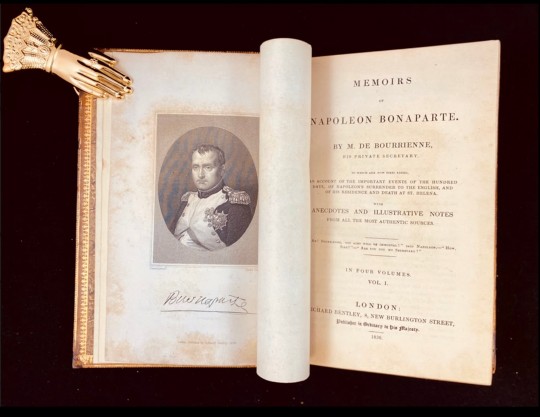
Napoleon Bonaparte was born on August 15, 1769, on the Mediterranean island of Corsica, and he was the second of eight living children. His father was a lawyer and his family were members of lesser Corsican nobility, though they were not a wealthy family. The isle of Corsica had been acquired by France from the Italian city-state of Genoa a year before Napoleon’s birth. Napoleon was educated on mainland France and graduated from a French military academy in 1785. He remained with the French military and rose through ranks but was on leave from the military in the early years of the French Revolution when it began in 1789. He had returned home to Corsica while on leave and became affiliated with the Jacobins, a political group which promoted the ideals of democracy. Several years later in 1793 after a political clash with nationalist governor of Corsica the Bonaparte family fled their home for mainland France and Napoleon returned to his military duty.
Through a series of events Napoleon became associated with Augustin Robespierre, younger brother of Maximilien Robespierre, a revolutionary leader in the Reign of Terror, which was a period of violence towards opponents of the revolution. When the Robespierre brothers fell from power and were executed, Napoleon was placed under house arrest due to his ties with the two revolutionaries in July 1794. In the following year of 1795, Napoleon assisted in suppressing an insurrection by royalists against the new French Republic government in Paris which resulted in his promotion to major general.

In honor of Napoleon’s birthday, two books have been selected from our Napoleonic holdings. One comes from a four-volume set called the Memoirs of Napoleon Bonaparte written by his private secretary and published in 1836, fifteen years after Napoleon’s death in 1821. The work is bound in a beautiful brown leather with marbled endpapers. Each volume contains portraits of key persons, but the frontispiece of the first volume depicts Napoleon. The second book featured is an 1837 publication of The Napoleon Medals: A complete series of the medals struck in France, Italy, Great Britain, and Germany, from the commencement of the Empire in 1804, to the Restoration in 1815 by Edward Edwards.
Citations:
Bourrienne, Louis Antoine Fauvelet de. 1836. Memoirs of Napoleon Bonaparte. Richard Bentley. London. https://bit.ly/3JTOvWq
Edwards, Edward. 1837. The Napoleon Medals: A complete series of the medals struck in France, Italy, Great Britain, and Germany, from the commencement of the Empire in 1804, to the Restoration in 1815. Henry Hering ... Paul and Dominic Colnaghi and Co. ..., London. https://bit.ly/3JXFpb3
“Napoleon Bonaparte.” History.com, A&E Television Networks, 9 Nov. 2009, https://www.history.com/topics/france/napoleon.
10 notes
·
View notes
Text
Aphorisms and quotes about the mother


Quotes and aphorisms on mom Quotes and aphorisms about the mother, ideas and thoughts by different and famous authors on the mom and the great importance of her presence in everyone's life. Mother's Day in most European states, the United States, Japan, Australia and numerous other countries is celebrated on the second Sunday of May; in Spain, Portugal and Hungary on the first Sunday of May; in the Balkan countries on March 8; in many Arab countries the holiday instead falls on the day of the spring equinox. Sigmund Freud said many profound, revealing and often frightening thing about God, and also about Mothers; yet he failed to see the connection between the two. The first God in every baby's life is its mother. She is the Universal Explanation, the Great Protector, the Stern Disciplinarian, the Source of all Wisdom and the Supreme Guide. God was not born of a virgin, but all virgins, male and female, are born of a God. When the growing human child realises, to his sorrow and bewilderment, that his mother is not God, he starts searching for a substitute God: a plain-clothes God or a God in disguise. George Mikes After the end of time, mother, we will find ourselves in the reality that does not exist, in a fictional and mythical world; we will be happy, serene, at peace, and finally we will be able to enjoy what we are not. Carl William Brown Where there is a mother in the home, matters go well. Amos Bronson Alcott On the verge of death he remembered his mother who was waiting for him in the reality that does not exist and almost pleased he consoled himself. Carl William Brown What do girls do who haven't any mothers to help them through their troubles? Louisa May Alcott Children and mothers never truly part; bound in the beating of each other’s heart. Charlotte Gray I am sure that if the mothers of various nations could meet, there would be no more wars. E. M. Forster A mother who is really a mother is never free. Honore De Balzac My wife is the kind of girl who will not go anywhere without her mother, and her mother will go anywhere. John Barrymore The mother's heart is the child's schoolroom. Henry Ward Beecher Be kind to your mother-in-law, but pay for her board at some good hotel. Josh Billings From now on I want to imagine death as a tender and affectionate mother who with extreme love, smiling and holding me at her breast for all eternity, instead of giving me life will take it away forever. Carl William Brown The best thing that could happen to motherhood already has. Fewer women are going into it. Victoria Billings The Holy Virgin is the universal essence of woman, she is the divine symbol of the mother par excellence, she is the spirit of life and love who endures and resists pain, suffering and death, to make the memory of her children immortal. Carl William Brown You do not really understand something unless you can explain it to your grandmother. Albert Einstein There are so many times you will feel you have failed, but in the eyes, heart and mind of your child, you are supermom. Stephanie Precourt A mother is not a person to lean on, but a person to make leaning unnecessary. Dorothy Canfield Fisher When a woman is twenty, a child deforms her; when she is thirty, he preserves her; and when forty, he makes her young again. Leon Blum Let France have good mothers, and she will have good sons. Napoleon Bonaparte

My Mom Innocenza Literature and art, as well as memory and memories, are the only places where we can revive our dear and beloved deceased. They are sad palliatives that unfortunately will never give me back the emotions and comfort of my mother's smile. Carl William Brown Women know the way to rear up children (to be just). They know a simple, merry, tender knack of tying sashes, fitting baby-shoes, and stringing pretty words that make no sense. And kissing full sense into empty words. Elizabeth Barrett Browning Some are kissing mothers and some are scolding mothers, but it is love just the same - and most mothers kiss and scold together. Pearl S. Buck The kind of power mothers have is enormous. Angela Carter There are lots of things that you can brush under the carpet about yourself until you're faced with somebody whose needs won't be put off. Angela Carter For Eliot, April is the cruelest month, and I agreed, in fact my father died in April, but then my mother passed away in October, so now the cruelest months are certainly two. Carl William Brown The chain of wedlock is so heavy that it takes two to carry it - and sometimes three. Alexandre (the Younger) Dumas For that's what a woman, a mother wants - to teach her children to take an interest in life. She knows it's safer for them to be interested in other people's happiness than to believe in their own. Marguerite Duras As my mom always said, ‘You’d rather have smile lines than frown lines.’ Cindy Crawford Some mothers are kissing mothers and some are scolding mothers, but it is love just the same, and most mothers kiss and scold together. Pearl S. Buck No culture on earth outside of mid-century suburban America has ever deployed one woman per child without simultaneously assigning her such major productive activities as weaving, farming, gathering, temple maintenance, and tent-building. The reason is that full-time, one-on-one child-raising is not good for women or children. Barbara Ehrenreich Take motherhood: nobody ever thought of putting it on a moral pedestal until some brash feminists pointed out, about a century ago, that the pay is lousy and the career ladder nonexistent. Barbara Ehrenreich A mother's yearning feels the presence of the cherished child even in the degraded man. George Eliot But the mother's yearning, that completest type of the life in another life which is the essence of real human love, feels the presence of the cherished child even in the debased, degraded man. George Eliot The lullaby is the spell whereby the mother attempts to transform herself back from an ogre to a saint. James Fenton See also It's not over when you lose, but when you end it. Unknown The mother as a social servant instead of a home servant will not lack in true mother duty. From her work, loved and honored though it is, she will return to her home life, the child life, with an eager, ceaseless pleasure, cleansed of all the fret and fraction and weariness that so mar it now. Charlotte P. Gillman

Quotes on mom Moms should never die, they should disappear and then appear when you need to see them again, even just for a moment. Valeria Fabrizi Mother is a verb. It’s something you do. Not just who you are. Cheryl Lacey Donovan A mother’s arms are more comforting than anyone else’s. Princess Diana Morality and its victim, the mother - what a terrible picture! Is there indeed anything more terrible, more criminal, than our glorified sacred function of motherhood? Emma Goldman The patience of a mother might be likened to a tube of toothpaste – it’s never quite all gone. Author Unknown Death freed my father and mother from their evils and imprisoned me even more in mine. Carl William Brown When I was a child, my mother said to me, ‘If you become a soldier, you’ll be a general. If you become a monk you’ll end up as the pope.’ Instead I became a painter and wound up as Picasso. Pablo Picasso Only after losing your mother forever can you understand the essence of true love and the excruciating pain of life passing away. Carl William Brown A mother is the one who is still there when everyone else has deserted you. Author Unknown You realize that you habitually thought of Mom when something in your life was not going well, because when you thought of her it was as though something got back on track, and you felt re-energized. Shin Kyung Sook No influence is so powerful as that of the mother. Sarah Josepha Hale A man’s work is from sun to sun, but a mother’s work is never done. Author Unknown Every man must define his identity against his mother. If he does not, he just falls back into her and is swallowed up. Camille Paglia He that would the daughter win must with the mother first begin. English Proverb A mother understands what a child does not say. Jewish Proverb God couldn't be everywhere, so he created mothers Jewish Proverb Men are what their mothers made them. Ralph Waldo Emerson

My mom when she was 20 All that remains to the mother in modern consumer society is the role of scapegoat; psychoanalysis uses huge amounts of money and time to persuade analysis and to foist their problems on to the absent mother, who has no opportunity to utter a word in her own defense. Hostility to the mother in our societies is an index of mental health. Germaine Greer The moments of happiness... We have had the experience of them, but the meaning has escaped us, as Eliot said. Or rather, we didn't realize it, so life passed by and in the end all I was left with was the pain of losing my dearest person, my mother. Carl William Brown Woman is the salvation or the destruction of the family. She carries its destiny in the folds of her mantle. Henri Frederic Amiel A mother’s arms are made of tenderness and children sleep soundly in them. Victor Hugo If at first you don’t succeed, do it the way your mother told you to. Author Unknown One good mother is worth a hundred schoolmasters. George Herbert The tie which links mother and child is of such pure and immaculate strength as to be never violated. Washington Irving A mother’s love is patient and forgiving when all others are forsaking, it never fails or falters, even though the heart is breaking. Helen Rice A man never sees all that his mother has been to him until it's too late to let her know he sees it. William Dean Howells Life began with waking up and loving my mother’s face. George Eliot Being a mom has made me so tired. And so happy. Tina Fey Behind every successful man is a proud wife and a surprised mother-in-law. Hubert H. Humphrey Whatever else is unsure in this stinking dunghill of a world a mother's love is not. James Joyce The watchful mother tarries nigh, though sleep has closed her infants eyes. John Keble Of all the rights of women, the greatest is to be a mother. Yutang, Lin All that I am or hope to be, I owe to my angel mother. Abraham Lincoln

Quotes and aphorisms on mothers My father and my mother are no longer with us, but their spirit lives in me, and therefore is still alive, except that I am already dead. Carl William Brown It seems to me that the nursing mother of most false opinions - both public and private - is the excessively high opinion one places on oneself. Michel Eyquem De Montaigne Anyone who doesn't miss the past never had a mother. Gregory Nunn Maternity is on the face of it an unsociable experience. The selfishness that a woman has learned to stifle or to dissemble where she alone is concerned, blooms freely and unashamed on behalf of her offspring. Emily James Putnam There is no way to be a perfect mother, and a million ways to be a good one. Jill Churchill Whenever I’m with my mother, I feel as though I have to spend the whole time avoiding land mines. Amy Tan, The Kitchen God’s Wife Few misfortunes can befall a boy which bring worse consequences than to have a really affectionate mother. W. Somerset Maugham The Enemy, who wears her mother's usual face and confidential tone, has access; doubtless stares into her writing case and listens on the phone. Phyllis McGinley It seems to me that the nursing mother of most false opinions - both public and private - is the excessively high opinion one places on oneself. Michel Eyquem De Montaigne When I stopped seeing my mother with the eyes of a child, I saw the woman who helped me give birth to myself. Nancy Friday Women’s natural role is to be a pillar of the family. Grace Kelly I know how to do anything – I’m a mom. Rosanne Barr A busy mother makes slothful daughters. Portuguese Proverb An ounce of mother is worth a pound of clergy. Spanish Proverb If Freud had had my mother's dreams at his disposal, he would have become even greater than he was. Carl William Brown Think of your mother and smile for all of the good precious moments.” Ana Monnar

Aphorisms and quotes on the mother A mother understands what a child does not say. Jewish proverb Mother is a verb. It’s something you do. Not just who you are. Cheryl Lacey Donovan A mother loves her children even when they least deserve to be loved. Kate Samperi As her sons have seen her: the mother in patriarchy: controlling, erotic, castrating, heart-suffering, guilt-ridden, and guilt-provoking; a marble brow, a huge breast, an avid cave; between her legs snakes, swamp-grass, or teeth; on her lap a helpless infant or a martyred son. She exists for one purpose: to bear and nourish the son. Adrienne Rich The worker can unionize, go out on strike; mothers are divided from each other in homes, tied to their children by compassionate bonds; our wildcat strikes have most often taken the form of physical or mental breakdown. Adrienne Rich Mother – that was the bank where we deposited all our hurts and worries. T. DeWitt Talmage A little girl, asked where her home was, replied, “where mother is.” Keith L. Brooks I never knew how much love my heart could hold until someone called me “mommy.” Author Unknown Mother’s love is peace. It need not be acquired, it need not be deserved. Erich Fromm Mothers are all slightly insane. J.D. Salinger That best academy, a mother’s knee. James Russell Lowell Setting a good example for your children takes all the fun out of middle age. William Feather Education commences at the mother’s knee, and every word spoken within hearsay of little children tends toward the formation of character. Hosea Ballou In a child’s eyes, a mother is a goddess. She can be glorious or terrible, benevolent or filled with wrath, but she commands love either way. I am convinced that this is the greatest power in the universe. N. K. Jemisin I love my mother as the trees love water and sunshine — she helps me grow, prosper and reach great heights. Terri Guillemets A mother’s love liberates. Maya Angelou Biological possibility and desire are not the same as biological need. Women have childbearing equipment. For them to choose not to use the equipment is no more blocking what is instinctive than it is for a man who, muscles or no, chooses not to be a weightlifter. Betty Rollin Only in America do these peasants, our mothers, get their hair dyed platinum at the age of sixty, and walk up and down Collins Avenue in Florida in pedal pushers and mink stoles - and with opinions on every subject under the sun. It isn't their fault they were given a gift like speech - look, if cows could talk, they would say things just as idiotic. Philip Roth Apart from my mother, women have always encouraged me to deepen my knowledge of the profound illogicality of existence. Carl William Brown A mother holds her children’s hands for a while…their hearts forever. Author Unknown

Quotes and ideas on mothers There was never a great man who had not a great mother. Olive Schreiner Mothers are the most instinctive philosophers. Harriet Beecher Stowe Mother is the name for God on the lips and in the hearts of little children. William M. Thackeray My mother had a great deal of trouble with me, but I think she enjoyed it. Mark Twain A Freudian slip is when you say one thing but mean your mother. Author Unknown There’s no way to be a perfect mother and a million ways to be a good one. Jill Churchill Acceptance, tolerance, bravery, compassion. These are the things my mom taught me. Lady Gaga Most mothers are instinctive philosophers. Harriet Beecher Stowe My mother’s menu consisted of two choices: Take it or leave it. Buddy Hackett My mother always said I was beautiful and I finally believed her at some point. Lupita Nyong’o A mother's heart is always with her children. Author Unknown Mother weaves her loving art and leaves her magic in our hearts. Author Unknown Mother-in-law: A woman who destroys her son-in-law's peace of mind by giving him a piece of hers. Author Unknown Men never think, at least seldom think, what a hard task it is for us women to go through this very often. God's will be done, and if He decrees that we are to have a great number of children why we must try to bring them up as useful and exemplary members of society. Queen Victoria How simple a thing it seems to me that to know ourselves as we are, we must know our mother's names. Alice Walker My mother is my root, my foundation. She planted the seed that I base my life on, and that is the belief that the ability to achieve starts in your mind. Michael Jordan Mothers work, not upon canvas that shall perish, nor marble that crumbles into dust, but upon mind, upon spirit, which is to last forever, and which is to bear, for good or evil, throughout its duration, the impress of a mother's plastic hand. George Washington The best place to cry is on a mother’s arms. Jodi Picoult It is not until you become a mother that your judgment slowly turns to compassion and understanding. Erma Bombeck Mother love is the fuel that enables a normal human being to do the impossible. Marion C. Read the full article
#divine#dreams#Freud#God#happiness#HolyVirgin#love#mam#mom#mother#Mother'sDay#mothers#philosophers#symbol#women
0 notes